#literally's literal analysis
Explore tagged Tumblr posts
Text
The floor of history: an analysis
This is going to be the final revision of this floor's analysis for at least a few months, im going to prioritise finishing other floors before coming back to it.
Major Spoilers for Library of Ruina and Lobotomy Corporation's story
The Abnormalities//EGO:
Scorched girl ("fourth Match Flame" (Currently "4th Match Flame"))
Happy Teddy Bear (The Forgotten (Formerly "Bear Paws" (Lob Corp))
Fairy Festival (Wingbeat)
Queen Bee (Hornet)
Snow Whites Apple (Green Stem)
happy teddy bear; scorched girl; fairy festival; and snow white's apple, all represent some form of loss or (in the latter two’s case) being betrayed.
The scorched girl was a child who lived a poor life selling matches, in the fires of the lit matches she saw hope for a better world bathed in the warmth that the flames provided, in her longing and pursuance for this better world, she burned to death; The Abnormality of the scorched girl is the soul of this child, betrayed and burned by the flames which promised her a better life.
Happy teddy bear is an abnormality that we have less knowledge of its past, only that it was abandoned and left to decay at some point by its previous owner; longing for attention the abnormality, upon finding someone who cherishes it like its old owner, will ensure that they are never going to leave
For the case of the Fairy Festival, it's the only one of the bunch to be the betrayer rather than not; the fairies of the festival will heal and take care of you, with ideas of them being able to sense goodness in people, and protecting those who are faithful and trustworthy (haha), but then: the hunger. The fairies are carnivorous creatures who simply attempt to keep their prey fresh through their “care”, being able to kill them in an instant despite their perceived nature.
I am not writing about Queen Bee
Snow white's apple, as the name suggests, is the witches poisoned apple from the fairy tale of snow white; the apple, after a single bite, was thrown to the side and left to rot, vermin and worms came over time, attempting to eat the apple, all of them died of the poison. After serving her use to both the witch and snow white, she was thrown to the side to rot, after which she started to look for her own path in life...
Angela and the Floor Realisation:
"Is it a sin that I was born this way?"
The thematic of isolation, which is present in the bear, apple, and child, is quite obvious to the realisation, Angela suffered untold period of pain, isolated from everyone surroundings her, suppressing her desires, her honest urges to stop the suffering of the employees, as doing so would only prolong the play;
Angela was punished for her existence; A machine created to be a human, created only to suffer endlessly where a human would not; Angela was punished for the sin of her birth, condemned to this hell, to orchestrate this play.
As the finale of the play comes, the Girl who had nothing, who was denied happiness since creation, who was not allowed the warmth of the stage, not allowed to stand alongside the others, saw a future in the light, the whispers of a future she could make, if she only claims the light, Carmen’s promises of her truest desires, mirroring the world seen in the flames of the Match Girl.
As both of these children have nothing in life, the Match Girl and Angela both desperately seek these promises shown in the blaze, chasing the light, their hope of the future, as it is all they have left.
In seeking the future she saw, the Match Girl’s last match burned out, and she, no longer having the warmth to guide her, was consumed by the night.
"If this matchlight goes out, nothing will be left for me."
Angela’s story diverges in the end, being pulled from the light by her one and only friend, not letting her be consumed, forgotten as she was always meant to be.
In relation to the scorched girl, who seeks to burn all that there is in order to gain this sought world in the flames, Angela seeks fulfilment in burning down all that Ayin planned for her, the petty revenge to see the hopes of others burned the same way that hers was.
"Maybe I could be free after I’ve burned down all things and then myself."
In the course of Lobotomy Corporation’s story, Angela grew to despise A, her creator, after being abandoned, both left to follow the script, and in the finale, where she is expected to simply lay down and cease after serving her purpose; in this idea of being abandoned Angela Resonates with the Happy Teddy bear. Being modelled after Carmen, in Ayins futile attempt to replace what he had lost, Angela was created, a human machine, despised by her created for existing in the manner he dictated for her; Angela was not abandoned at the end, Ayin had abandoned her the moment of her birth, as soon as she first spoke.
“I remember you… You were a person with a warm smile…"
In this denial of an ending, a place to stand amongst the others as the show concluded, Angela, despite her value, her necessity in the play, was simply used as a blessing for others only to be cast aside, expected to rot.
In this desire of being denied an ending, of being disposable to those who needed her, Angela creates her own ending; In being forgotten, abandoned, left to rot, Angela’s desire for a life of her own is manifest through the library as a whole, and causes her to resonate with the Snow White's Apple:
"My existence was born from a yearning and began as a curse, yet I served as a blessing to others."
Akin to the apple, Angela was made to serve a purpose and be discarded; Both left waiting in their isolation, waiting for someone to come to them, waiting until the last moment for Ayin to look at her; As the apple grew limbs, in search of her own story, her own prince, Angela walks in search of what she had been denied, a life, a story, a happy ending rather than being neglected until the end.
Through the true ending of Lobotomy corporation, Angela makes the ultimate betrayal in defiance and spite of Ayin's plan; After eons of living simply to serve others, to complete this act of the play, she was still unable to stand on the stage with the others at the finale:
The connection of the fairy festival is one of her deceptions, the presumption of her goodwill and servitude to the plan used to hide her true intentions. As Angela says herself:
"I did everything to care for you, so it’d be only fair that I get something in return."
Just like the famished fairy, being starved, deprived and denied of her innate desires for so long, Angela takes action herself, looking to consume hopes of others, the culmination of this time spent starving, all for herself.
Now, as she attempts to satiate her hunger, the desires that have been aged for millennia, denied for her sin of existing, Angela pilots the Librarians in the same manner that Ayin set the script; The Library’s guests, the librarians, the Sephirot, suffering to make Angela’s will manifest, sending countless to their deaths, to be killed and forgotten, all for her pursuit of humanity.
"No one remembers those who gave their effort to raise the kingdom. It’s a truth that repeats on and on."
In taking on the role of the Queen, Angela takes the role of her father, forgetting those who suffered, who worked towards the ending, seeing others as disposable, only tools to achieve a purpose.
"There can’t be any meaning to a history that repeats itself. Attain the will to stand up straight by looking back? You know nothing about my past."
[Insert Natural Segue]
The Willingness to Stand up Straight:
Elijah, Malkuth:
Lobotomy Corporation, in regaining the memories of her trauma, Malkuth sees her death, in impatience she tested the substance Cogito on herself, after being denied as a test subject several times. (oh god that is one fucking sentence isn't it) In this recklessness, through her desire to help the Cogito project, her determination to make a difference in the project, Elijah, now Malkuth, died, decaying from the experiment. Writhing on the floor in pain, begging Ayin to turn around and help her, there is no option but to ignore her. Ayin did not remember everyone name, nor respond to or make "meaningless gestures" of praise, which only fueled Elijah's fervor to make a difference in the project, to have the fruits of her effort be tangible.
Overcoming this despair, in competing the Meltdown, Malkuth sees a glimmer of hope for improvement, she cannot continue to look back with hopes of changing her choices, to despair at her own actions. Instead, she sees the possibility of improvement, and gains the willingness to stand up straight, to hold her head high rather than being weighed down through her past.
Like Angela, Elijah was cast aside by Ayin, finding only despair when seeking rewards for her deeds:
Though already having faced her past, overcame her trauma, the Abnormalities on this floor represent Malkuth's, Elijah's, history:
Through Ayin's lack of validation, a desire begins to take place, hollow, demanding to be filled. Only driven further by her impatience, Elijah is driven to take action for this hunger, to finally satiate herself in return for her actions, in the same manner as Fairy festival.
The famished faeries (fairy's? fairies?), being unable to feed their desires for so long, begin to consume other faeries, destroying itself in the process.
"I knew I didn’t have any right to participate in the experiment, that’s why I was so impatient." "Will you finally praise me? I just want to feel proud."
In seeking her desires, wanting validation from Ayin for her efforts, Malkuth loses her hopes, being burned by the supposed source of her rewards, losing hope for the future.
in seeking this validation, like the Scorched Girl seeking the world seen in the flames, Elijah's story ends in a death, alone and forgotten by others.
"Make sure you feel this horrible sense of helplessness to your core, right to your heart."
After working so hard, sacrificing herself to be useful, to finally be praised by Ayin, he refuses to turn around to see her. Not even acknowledging her, even as she reaches out to him.
Just like all the others who have been burned by Ayin in the past, Elijah represents the workers of the queen bee, seen as disposable by the queen (Ayin Queen Bee art is next on my to do list), sacrificing everything for the greater workings yet never being remembered, not being rewarded, only discarded when they have outlived their usefulness.
"No one remembers those who gave their effort to raise the kingdom. It’s a truth that repeats on and on."
After everything that she had done, she was abandoned by Ayin, forgotten, left to the wayside to rot, to be forgotten, like the Apple and the Bear which appear before us.
"Be honest, back then it wasn’t that hard to turn around and look back at me."
Where the story of these two abnormalities diverge follows the point where they were abandoned. While the bear seeks the fulfillment of a new, loving owner, the Apple seeks its own path in life, growing to find its own path, its own fulfillment. While Elijah, now Malkuth, was abandoned by Ayin, in the past, rather than seeking the same fulfillment that she sought from Ayin, she looks to the future, with hope of improvement, the Will to stand up Straight.
Angela:
Like Malkuth looks back at Elijah to gain hope, to know that her past does not define her, Angela must realize the same, as we can see from her quotes in the realization:
"Attain the will to stand up straight by looking back? You know nothing about my past."
In the same way that Ayin refused to look back on Elijah, refused to create a place on the stage for Angela, the sufferings of both were ignored.
Angela refuses to look back at her past, to realise what she has become. Angela cannot gain hope for the future without accepting her past, she cannot gain the Will to Stand up Straight as long as she is defined by her suffering, by her past.
"Looking back on myself… It wasn’t even so difficult to do."
Angela says, mirroring Malkuth's own words towards Ayin.
Angela, following the realisation, like Malkuth, looks towards the future, to seek her own path, undefined by her trauma, free from the script that bound her.
. Thank you for reading this Essay, the Ayin Queen Bee thing is not a joke, there is an actual list and it was next down.
If you liked this essay consider following and/or suggesting something for me to write about.
and for a final note, a quote from Angela's realisation:
"I can’t fly with ragged and tattered wings."
... Yi Sang Hornet EGO when?
#project moon#library of ruina#lobotomy corporation#lor#cogitopedia#lob Corp#Angela#angela lobcorp#pm angela#angela lor#malkuth#Malkuth Lor#malkuth lobcorp#Elijah Lob corp#media analysis#character analysis#Project#Floor of history#essays i wrote primarily while half asleep#im surprised i found any natural segue for talking about queen bee in the final sections#no im not talking about Queen Bee in general#Asiyah floors#literally's literal illiteracy#literally's literal analysis#Floor analysis#Angela Series
40 notes
·
View notes
Text
Thinking a LOT about Lucifer in the latest Hazbin episode. Idk what I was expecting but not this??
As I was watching my immediate thought was just "huh... Lucifer is kinda of weird..." but as the episode went on I realized the issue
the dude is off the chain depressed, like he says it as a joke but holy cow it is SO BAD
He's manically just creating rubber ducks cuz his daughter really like it that one time but it's empty, it's never good enough but he keeps doing it, maybe cuz he doesn't know how to pass the time otherwise.

like I get the feeling he HAS better things he SHOULD be doing than making rubber duck after rubber duck. At first I was like, "Bruh why isn't the king of hell doing anything?" aaaaand then it became clear...
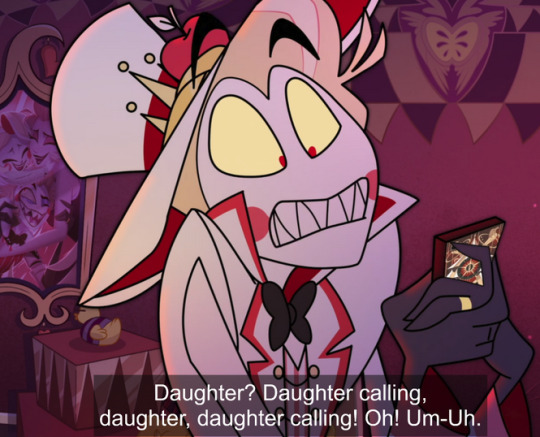
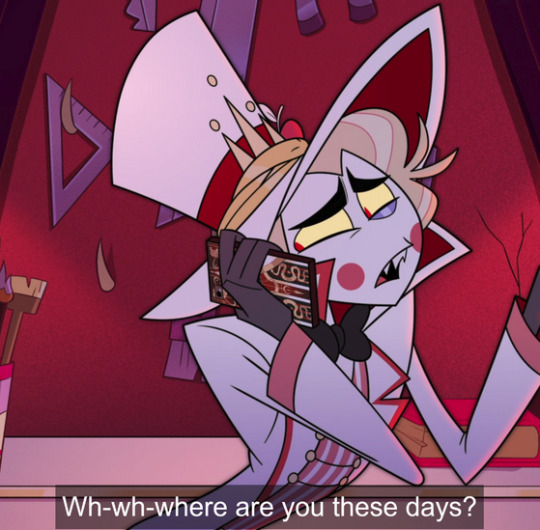

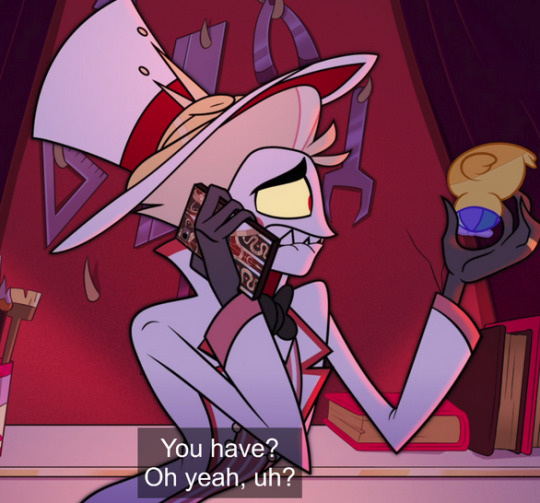
The dude is disassociating so bad he can barely hold a conversation let alone remember information. He clearly WANTS to, he wants to be involved with his daughter so bad, he wants to care about the things she's doing so bad, but his depression keeps interfering. It's like he can only hear every other word and he grasps onto the ones he does hear semi-out of context. Like you can see every time he catches something that he hadn't before and he just "well shit I didn't catch that part"
and that's why he reacts so weird when people talk to him. He is struggling so bad to engage with the conversation he's only getting 50% of it
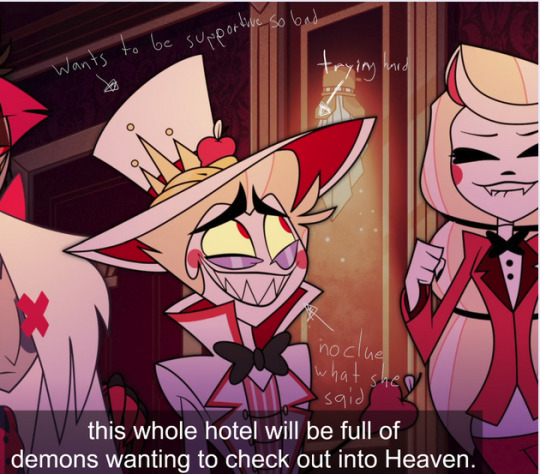
does that look like the face of a man who knows what the hell the conversation is even about??? he is STRUGGLING
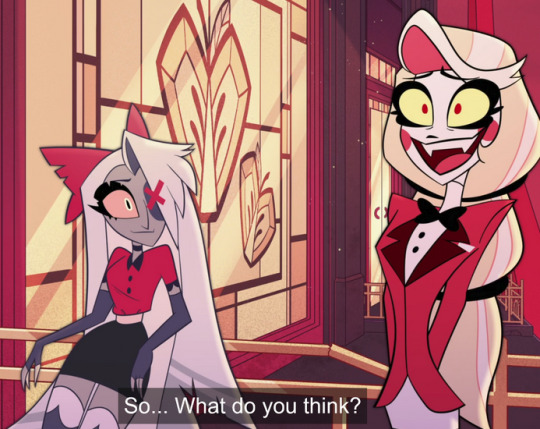

like Charlie spent so long telling him about the hotel, and he STILL didn't understand what she wanted. Yeah it comes off as ditzy but literally I've been in that position where your brain just "nope, not doing this right now" and nerfs your conversation comprehension. So as someone who's BEEN in that position, to me it feels exactly like what he's dealing with. He's sorta engaged with the conversation, but only as much as his brain will allow
For example, when I'm dealing with this, this is what someone talking to me feels like this where the crossed out parts are what I missed and bold is what I catch, "Hey! You know I was thinking for dinner we could either make some chicken with rice? But if you don't feel like cooking, pasta is super easy and you love that right? What do you want to do?" you can kinda get that someone is trying to talk to you about dinner, and towards the end you get the impression that they asked something that needs your input so you can decently put 2 and 2 together and try and pass off, but crucial bits were left out, I would have no idea that either chicken or pasta is in the conversation only having heard "rice". When someone is just talking at me, I can decently pass off as being engaged but the second I'm required to participate in the conversation I'm screwed. Seem familiar? At which point I have 2 options, try to give a bullshit answer, or admit that I missed what they were saying and ask them to repeat
Lucifer, unfortunately, is trying so damn hard to hide that he's dealing with like 24/7 dissociation, so he can't admit that he's missing entire chunks of the conversation, hence his really weird replies. He does eventually get the full picture and then he and Charlie start having the real conversation
Also, the Alastor/Lucifer rivalry was hilarious but also really indicative of more of what Lucifer is dealing with
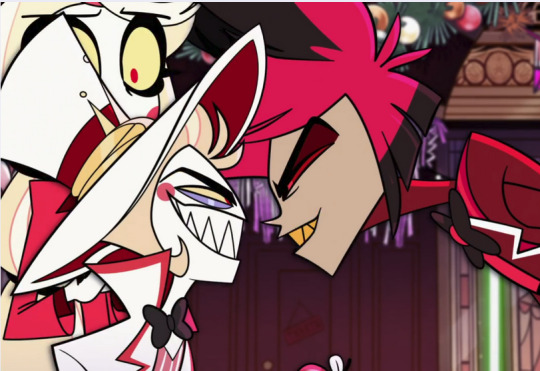
Alastor is, unfortunately, really good at picking up people's insecurities, and thanks to Charlie's description earlier and watching Lucifer clearly trying to overcompensate, he immediately picks up on the fact that Lucifer KNOWS he struggles to be a good dad (we know cuz it's cuz of the depression, hard to be engaged when your brain keeps turning off) and decides to rub salt in the wound by pretending he's been acting as a surrogate father to Charlie. Now why Alastor decided to pick a fight with the king of hell is beyond me, I do not understand Alastor (and I LIKE IT) (maybe it's cuz Alastor thinks he's hot shit and was expecting Lucifer to at least have heard of him but Lucifer just treats him like a nobody? who knows)(why would Lucifer listen to radio anyways when he can't even pay attention to a conversation it'd just be white noise)
But yeah I just was expecting someone who oozed either charisma or presence and instead I got a depressed dad who's dissociating so bad he can barely function and be present in his life. The only thing it seems he CAN do is make rubber ducks cuz his daughter really liked it that one time
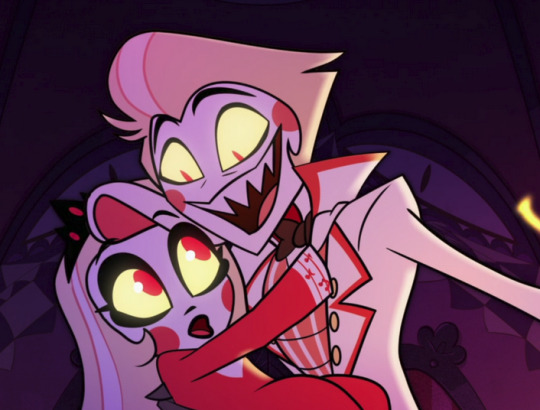
Idk Lucifer is tragic to me. Whatever the full details of what heavan did to him absolutely broke him and he can't deal with it. He's aware of it, and he doesn't know how to fix it, so he tries to over compensate and sorta makes an ass out of himself but no one says or does anything cuz this guy is supposed to be THE king of hell
Suddenly it's making a lot more sense why he just rolls over and lets heaven do what it wants and even told Charlie to go in his place the start of the show. He's not in any headspace to hold a basic conversation let alone negotiate! He didn't even know who Alastor was, he's been so out of touch
idk I like him, he seems sweet, I hope Charlie brings some light back into his life. He really needs to get out of that rubber duck room
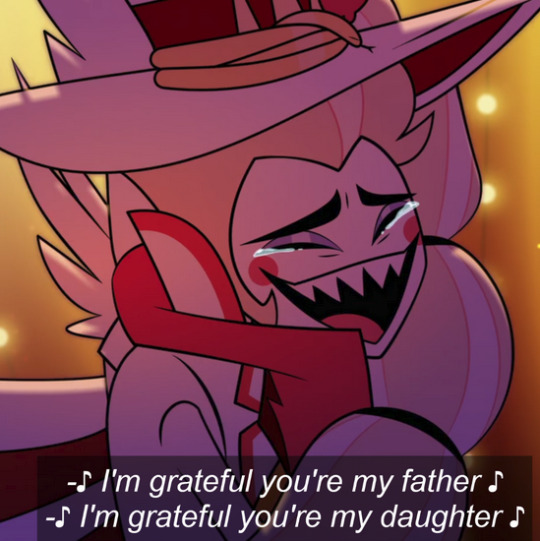
#hazbin spoilers#hazbin hotel#lucifer#lucifer morningstar#analysis#dissociation#look idk what to tell you all#I watched the episode and everything makes so much more sense#when you realize he's only intaking like 50-60% of the conversations#he's not bad at listening his brain is literally preventing him from getting everything#literally I've been there#the difference between him and me tho#is that he can't show it#he's the king of hell#he has to bluff his way through conversations#but yeah literally rewatch the episode with this in mind#and watch him reply to the things he DID catch#anyways#NEW BLORBO????#who'd've thought I would go into Hazbin Hotel#and come out with freaking LUCIFER as my favorite character#I love him#he's so sad
15K notes
·
View notes
Text
i have suddenly become obsessed with a theme that HoO established but never proceeded to extrapolate on, which is:
You are Percy Jackson, and you have been swapped with a boy who was allegedly everyone's favorite person, but they have decided to replace him with you. They just met you. You stand next to his best friend and the people he's known his entire life. In his home. In his cloak. In his place. They stopped looking for him.
You are Jason Grace, and you have just found out you have a long lost sister who completely replaced you in her life with this girl you just met. Your lives and personalities are mirrors. She is you, living the life you were robbed of.
You are Annabeth Chase, and you have just become starkly aware that you have been inhabiting the void left behind by your best friend's long lost brother. You and Luke were just replacements for him. Now you have to look him in the eyes when he has nothing and know you took that life from him.
You are Piper McLean, and you have just found out your relationship is fake and built entirely on the memories of Annabeth Chase. You have been given a boyfriend when hers has been taken away. You have no idea how much of it is real or not but regardless you feel like if your relationship isn't exactly in their image that you have failed.
You are Leo Valdez, and you have just learned that you are the echo of your great-grandfather. You are not your own person. You just exist to be a mirror of him. A doppelganger. An actor and stunt double facing all the danger he never had to but wearing his face. To be there for his best friend decades later simply because he couldn't. You are playing a role. A seventh wheel and a pawn for a goddess who carefully sculpted your entire life for her own purposes.
You are Hazel Levesque, and the only reason you are alive is because your brother couldn't save your his sister. You are a consolation prize. An apology. Your existence here is misplaced in every way but you inhabit it anyways.
You are Frank Zhang, and you are a shapeshifter. Inhabiting your own body feels strange and clumsy when you could be literally anything at any time. You are anything and everything and live your life with the simple certainty of knowing exactly how you will die.
#pjo#hoo#heroes of olympus#percy jackson#riordanverse#jason grace#annabeth chase#piper mclean#leo valdez#hazel levesque#frank zhang#meta#analysis#me shaking hoo: what if we actually address the interpersonal dynamics of the characters. please. please. please. please.#frank is the only person on the boat not having an identity crisis tied to another member of the crew somehow and that is FASCINATING#but also WHERE is all the interpersonal literally anything. hello. please. making grabby hands. everybody identity crisis go.#i wanna see the entire argo ii crew stumbling through trying to figure out their places and senses of self!!!!!#particularly in relation to each other!!!!! we get snippets but we rarely ever get the full thing or a resolution!!!#like. HELLO??? Piper acknowledging that her relationship with Jason is artificially sculpted in the image of Annabeth and Percy???#and that her ideals of what Jason and her can be are just that she feels like they need to be like what Percy and Annabeth have????#and thats just DROPPED COMPLETELY????#poor Jason is getting replaced twice. Leo is not his own person.#Hazel at least gets the resolution that Nico does not truly see her as a consolation prize#but Annabeth gets to be hit with the like EIGHT YEAR DELAY of learning the place she inhabits in Thalia's life is the echo of someone else#cause like. yeah she knew Thalia had lost her brother but i dont think it clicked for her until she met Jason that oh. she *replaced* him#Frank at least has some certainty about his identity in one aspect (his curse). everybody else is floundering a bit#except for maybe Percy but its kind of the camps of ''i replaced this person and it weighs on me'' versus ''i have been replaced''
3K notes
·
View notes
Text


we should all kill ourselves idk
#i'm literally going to be sick#yellowjackets spoilers#yellowjackets#yellowjackets season 3#van#van palmer#yj 3.09#taissa turner#lottie matthews#shauna shipman#jackie taylor#natalie scatorccio#yellowjackets meta#yellowjackets analysis#hope i die#fate eats you up#posts#yj 1.09
1K notes
·
View notes
Text
just. little things. specifically right now it’s the fact that they even managed to narratively incorporate and retroactively explain the video game Instinct To Collect. like yeah you the player collect things that sparkle when you get close because you are Playing A Game but. think about it. link, fresh out of a hundred years of sleep with near-total amnesia, instantly notices and instinctively picks up edible plants and mushrooms throughout hyrule without really knowing why. and only later do we learn that he loved to cook. he knows what is and isn’t edible and what is worth collecting instinctively because he’s used those same ingredients thousands of times before. breath of the wild you are the only game that matters ever
#guys this is bad. i’m supposed to be packing up my apartment right now#stay tuned for literally three million more posts like this#personal#zelda analysis#and stuff like this is also why totk didnt work as well for me personally. because everything felt too game-y#whereas botw was so like. seriously grounded in almost every sense.#why are we collecting shit in totk?? well because in theory someday we might want to stick it to a weapon#but that’s such a Video Game Thing To Do. yknow
576 notes
·
View notes
Text
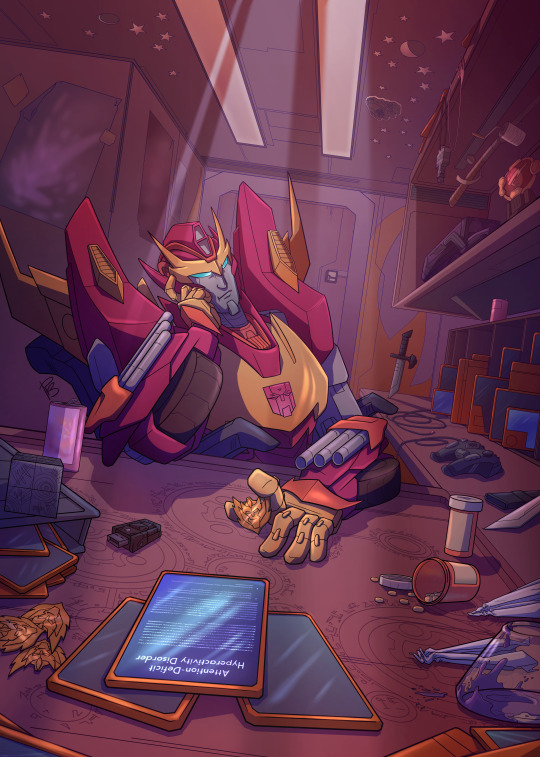
diagnosis
my piece for the Out Of Spec zine about Transformers and disabilities! the zine itself is sort of in limbo but we've been given leave to post our finished pieces. obviously i had to draw my ADHD king. i've also got this as a print, i need to put it up in my shop...
#outofspeczine#macaddam#transformers#neurodivergence#rodimus#tf idw#mtmte#zine stuff#prints#im somewhat nerfed when doing analysis of idw bc i literally cannot read him without seeing adhd written all over him#it colors my perception of everything
624 notes
·
View notes
Text
EPISODE 6.15 "The French Mistake" IS SO VERY DESTIEL CODED
LIKE
it's actually so revealing that Jensen and Jared are staying in-character despite how surreal everything is? this is Dean and Sam in our world, and from the get-go it's pretty obvious that they are confused beyond words. like, Dean's "oh crap, I'm a painted whore" is just?? iconic?? authentic Dean Winchester moment!??? LOOK AT HIS FACE, BABYGIRL IS SO CONFUSED

and this is relevant to my point bECAUSE it's irrefutable proof that this is 100% Dean and Sam from the show, that they are themselves.
sooooooo
can we please talk about Dean eye-fucking Castiel into oblivion (as you do!!) until Misha stops acting the part, and right the hell away Dean figures out that it's not Cas and is just. no longer interested!?? he's like, alright i'm done with whoever this is!??
his face just falls
and he doesn't even look at Misha as he leaves, just like when he met Jimmy Novak and his homoerotic vibe simply vanished - because that's not his autistic soulmate, it's just Some Dude??
mind you, it's quite interesting to notice that Sam doesn't see what Dean means, because "dude, look at him". which is shorthand for, wdym Dean like he's wearing the trenchcoat with the blue tie, he looks like he doesn't know how to spell the word "hairbrush", he's eye-fucked you right in front of my face as he does.

BUT DEAN!! dean is just like, fuck no that ain't cas
not MY cas anyway!!
the destiel of it all, the dESTIEL IS JUST EXQUISITE
also "Hola, Mishamigos" as he tweets with his tie loose has to be peak Misha Collins energy like. that man was being paid to be unhinged onscreen. what a day it must've been for him
#like you can literally see the exact moment when dean realises he's not talking to HIS castiel#because he tenses up his jaw and does this thing with his eyes where he's looking zero in love and one-hundred percent uninterested#acting choices were made and they were all the right ones!!#the destiel of it all oh good god#gee watches supernatural#spn#supernatural#dean winchester#jensen ackles#sam winchester#jared padalecki#castiel#misha collins#destiel#deancas#jacting joices#supernatural analysis
808 notes
·
View notes
Text
The development of a break up?
#LMAOO that comment actually made me cackle when I saw it#season 4 is LITERALLY their WORST season…#out of alllll the seasons you think season 4 is the season of their development?#byler#byler endgame#mike wheeler#stranger things season 5#will byers#byler s5#stranger things#byler nation#byler analysis#byler brainrot
617 notes
·
View notes
Text
it is completely understandable to be uncomfortable with the sexual assault in dandadan. it's important to discuss how it's framed, whether it's handled poorly, or if it could be been portrayed better. but the number of people - even fans - stating that it is only fanservice, irrelevant, or could be removed is frankly bizarre to for SO many reasons, starting with the fact that this parallel exists.
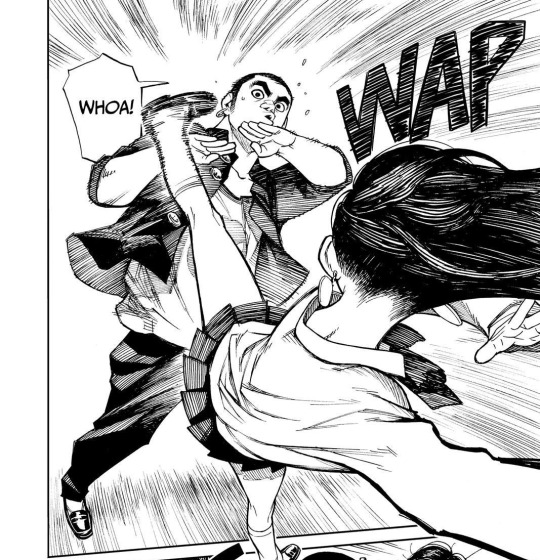
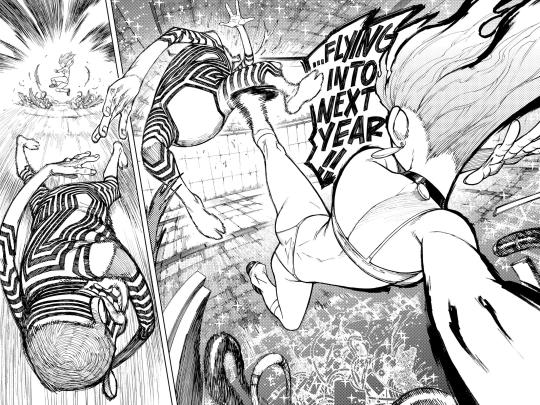
the anime made it even more obvious by interpolating cuts from the first scene into the second one.


i thought this scene showed that momo gaining her powers by believing in her relationship with her grandmother gives her the strength to fight back against what is basically a horrific, much more aggressive and abstract (maybe even absurd?) representation of her shitty gross ex - who was demanding she 'put out' and pay for the love hotel in very first scene.
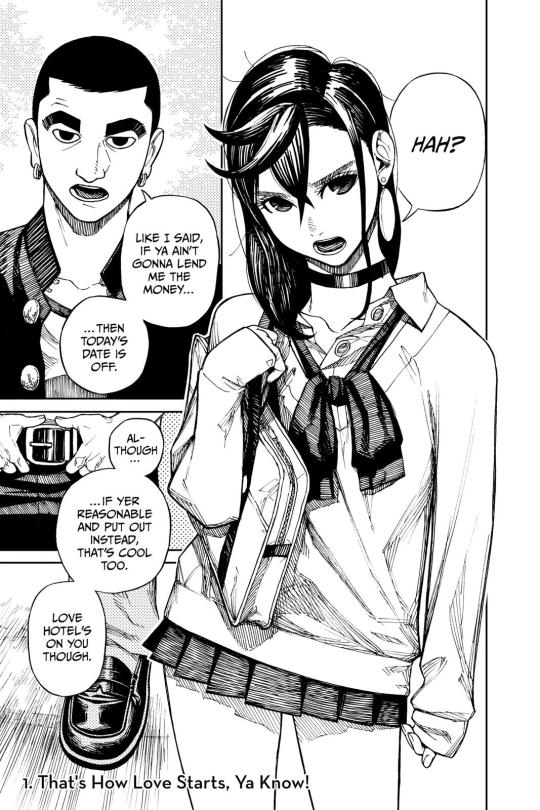
while the escalation from one scene to the next is surprising, it's not something that comes out of nowhere. this first scene is meant to be a set-up to what will happen later. it sets the tone, though significantly more lighthearted at this point. it tells you that sex, sexuality, etc. is something dandadan will touch on - though you don't know what the scope and depth will be until later in the chapter.
i cannot recommend this video enough, as it discusses some interesting interpretations of what the serpoians and turbo granny represent in their respective assault scenes, as well as how right now the treatment of both scenes is unfortunately uneven.
more notes about plot and thematic relevance below the cut. spoilers for anime-onlies (up to chapter 8, will probably be covered in episodes 4/5).

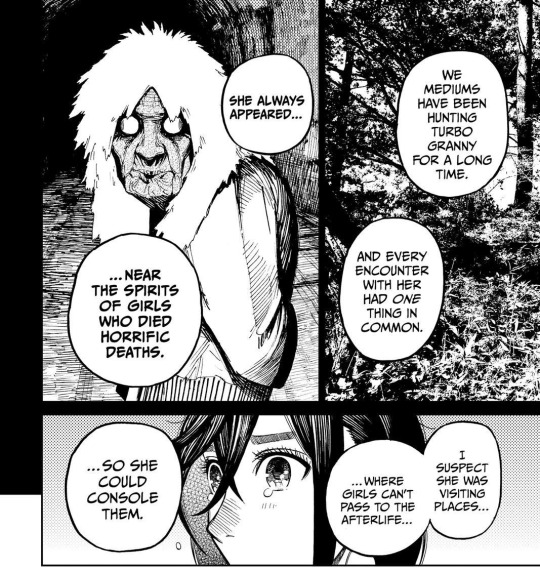
momo was assaulted, and almost cut up by the serpoians, much like the other victims turbo granny appeared around. this is an intentional parallel. turbo granny goes to momo because that is what she does. again, SUPER unclear how that factors into turbo granny's assault of ken, but if we keep the video's interpretation of cynicism in mind, it could be related to that; maybe turbo granny has a cynicism toward men - similar to momo in chapter/episode 1 - and this is why she chose to attack ken. unfortunately, it's still too early to really understand and explain a lot of her motivations.
again, completely understandable to not like how the sexual assault was handled or portrayed, and it's important to keep discussing it. but this is what dandadan does for many different types of trauma and difficult life experiences. this is a huge part of dandadan's identity. if you don't like it, that is fine, but calling the sexual assault 'just fan service' is blatantly untrue.
#dandadan#L.txt#long post#dandadan analysis#< i guess? 😭#discussdadan#sorry for this kinda sloppy post but i need it out bc i feel like im losing my mind#this is not even ''''''''''a defense''''''''''' of the s/a i think it's really important to discuss framing/handling/etc etc#but some of the discourse arising from the first episode is maddening and is thoroughly not helped by ppl being weird/assholes abt it#you dont ''''''have to like it'''''' (< what does that even mean??) or keep reading it or literally anything#this is just a basic 'please engage w the text'
1K notes
·
View notes
Text
Actual Ultimate Classpecting Guide
For real this time.
Buckle up, this is a really long one. For everything that's posited, I can provide textual evidence; that being said, I'm not going to be including the textual evidence within the essay itself, because it's already long enough as-is. As such, please feel free to ask for clarification or sources on any assertion, and I'll do my best to provide.
Before we begin, there's some things to discuss about how we're going to be approaching classpect in the following essay. In numbered list form for our short attention spans:
1. There is a concept Hussie talks about multiple times in his book commentary, "personality alchemy" - the idea that there are these "platonic ideals" of certain characters, which can be mixed and matched with others, in order to create new characters. The examples he gives are of how Eridan was a proto-Caliborn, how Kanaya has shades of Jade, how Nepeta was a proto-Calliope, and how Sollux and Eridan have shades of Dave in them. Classpecting is fundamentally a form of this personality alchemy:
2. Class describes the character's arc and emotional hurdles, while Aspect describes the character's base personality traits by which this arc is experienced.
3. For example, all three Seers struggle with hubris: Rose's need to be the smartest person in the room led to her being manipulated by Doc Scratch, Terezi's obsession with meting justice led to her engineering a situation where the only option was to kill Vriska, and Kankri's desire to be seen as a spiritual leader amongst his friends led to him furthering their divisions and harming them.
Then, when their pride is shattered, they cope by inflicting willful self-blindness: Rose turns to drinking herself stupid (the opposite of Light's sway over knowledge), Terezi gets down with the clown (the opposite of meting out Mind's justice, as it's a Gamzee W), Kankri goes celibate (Blood L) despite his clear romantic feelings for certain teammates.
4. As for Aspect: note how all three Life players share the personality traits of optimism, stubbornness, and obstinacy. All three Breath players share an immaturity and naïvety, and are quite frankly irresistible to people for some reason. All three Light players share a need for the spotlight and a tendency toward long-windedness and persnicketiness. So on and so forth.
What's interesting is, if you start analyzing characters that share Classes and Aspects, these specific types of similarity crop up over and over - all our Knights struggle with insecurities and facades, both our Bards have a crisis of faith. All three Breath players have an aspect of immaturity and childishness to their characters, and all three Light players are deeply concerned with appearing intelligent and feeling important.
5. As a result, this guide is NOT intended for classpecting real life people, because we are complicated, we contain multitudes, and we don't have arcs. This is primarily an analysis of what Class and Aspect mean in Homestuck based on textual evidence, because I genuinely believe that you can basically figure it out if you read carefully.
6. Duality, and the idea of "equal and opposite," are major themes within Homestuck - Prospit and Derse, Skaia (described as a crucible of birth and creativity) and the Furthest Ring (the literal afterlife). Which classes are involved in an Active/Passive split, and opposing Aspects, are the same way. This is the primary method I used to determine the Active/Passive pairings and opposing Aspects. After all, as Callie describes, both Thieves and Rogues are classes "who steal" - so, too, do I try to unify Classes by a common theme, even if they diverge wildly in how that theme is expressed (as Thieves and Rogues do). In the same way as the opposite of "up" is not "apple," but "down", because "up" and "down" are both fundamentally concerned with relative vertical position, so too can be defined concepts like Breath and Blood, Hope and Rage, Light and Void - as well as the reasoning behind Class pairings like Heir and Page, Maid and Knight, and Seer and Mage.
7. Descriptions for both Class and Aspect are left deliberately vague and up to interpretation within the comic itself, and this is by design: the actual manifestations of an Aspect can vary wildly given the Class, and even individual person, that it's tied to. Calliope even makes note of the fact that, under the right circumstances, someone can manifest effects that appear to be the opposite of their aspect. She's also careful to couch her language in "may" and "can" - because these concepts are intentionally somewhat nebulous and malleable. As such, while this guide certainly lays down what can be gleaned and inferred from the text, do note that Homestuck runs on a soft magic system, and as such, nothing stated is firm, 100%, must-always-be-this-way - just an overview of what we've seen.
8. There is often great overlap between Aspects, Classes, and Classpects - which Calliope herself notes. Heart and Blood are one of the most salient, as they both have a fixation on relationships, and Calliope mentions that under the right circumstances, a Classpect may even be able to manifest what appears to be the opposite of their Aspect. Again, Homestuck operates on a soft magic system, so this is a feature, not a bug.
ASPECT
There's a little less to say about Aspect, not because it's less complicated, but because "base personality traits" are much more nebulous compared to Class's sway over character arc. Still, Aspect represents the fundamental way a character is, and thus, color every interaction that character has. There's a reason Ultimate Selfhood is sought through Aspect, not Class - Aspect is the core of the character's being, what makes that person that person.
That all being said, Class has major sway over how an Aspect manifests, and certain classes can even invert the Aspect and even the character's role in the party. As such, these descriptions must be parsed carefully in relation to Class. Moreover, due to the soft magic system, there is at times overlap between unrelated Aspects, which can also be exacerbated by Class - Heart and Blood being the most obvious in this regard. Still, overall, you'll find the Aspects to be fairly distinct from one another.
Please also note that every Aspect can deal with its literal counterpart by default - Light players can wield lasers, Breath players can wield the breeze, et cetera. Because this kind of goes without saying, and because the non-literal stuff is more interesting to discuss, I'm not really going to go into too much detail about the literal qualities.
Finally, something interesting to note is that nearly every Aspect follows its own Hero's Journey cycle - full actualization for each one usually means reaching around to its opposite Aspect, and taking lessons from them - for example, Breath players need to learn maturity and responsibility, while Blood players need to learn relaxation and whimsy. Thus, an Aspect at its worst manifests in two ways - either a toxic overabundance of the Aspect's worst traits, or such a dearth of the aspect that it begins to resemble its opposite. Only by reaching into the opposite, however, can the player be tempered and reach full maturity - can they become more of who they are.
SPACE / TIME
Space and Time are both concerned with physical reality, goals, and the way one approaches them.
Space is associated with "the big picture" - with recycling, reproduction, and the interconnectivity of all things. The aspect also presides over the enjoyment of the journey over the destination - Space players serve as reminders that the present moment is as important as the end goal. Space is often a more passive Aspect, being the stage upon which the story is set. They're the hosts of the party, and the one who marks the ending.
Its players reflect these tendencies, often being feminine, with penchants for life-giving acts such as gardening. Their personalities tend towards frivolity and silliness, finding it difficult to stay on-topic or bring full gravitas to serious situations. Perhaps a better word would be "distractable;" when the aspect is so concerned with all things in connection with each other, it's easy to lose track of details, and it's easy to enjoy things simply as they come. Space players tend to be kind, patient, and forgiving, which is a strength as much as it is a flaw; it's easy for malicious actors to take advantage of this compassion, or for the Space player to find themselves in a poor situation by being overly permissive. They can easily be painted over by stronger personalities, and tend to struggle with romantic relationships, as they attract many with their kind and giving natures, and few are naturally so considerate of the Space player in turn.
"Passive" is a good word to use; at a toxic overabundance of their Aspect, Space players are trampled underfoot. They become enablers, servants to dark forces, or so lost in their own worlds that they neglect the one they live in. With their Aspect "inverted," a Space player becomes a demon of poor prioritization. Distracting not just themselves from their true purpose, but others, too, the Space player will wreak havoc by overemphasizing unimportant topics and ignoring important tasks. This superficially resembles Time, in that the Space player will become fanatically dedicated to their task, but note that the poor prioritization is still Space-esque at its core.
Still, within this nadir is a valuable lesson: the strength of self-assertion, and the determination to see a goal through. These will allow the Space player to weed their garden, separating good from bad, allowing it to flourish like never before.
Time, in contrast, is associated with "the little things" - with details, minutiae, and processes. Time presides over the struggle toward something greater, the endurance of hardship with an eye on the prize - the destination over the journey. Time players are the ones keeping track of the tasklist, marking off each item as it reaches completion; they are the tireless workers keeping the whole engine running.
Time players, thus, are ones whose lives are marked by struggle. They are highly goal-oriented; in contrast to how Space players can easily move from goal to goal, task to task, Time players feel bound to see things through to the end, finding satisfaction only when they've achieved their desired result - and only until they come across the next goal in their journey. A Time player isn't happy without a goal to work towards, a craft to polish, a prize to win - but this driven nature can easily be its own downfall, as it leaves little room for the player to admit to their own shortcomings, or ask for help from others. Moreover, their focus on minutiae can leave them blinded to the bigger picture, and it's easy for a time player to fall to despair, able to do nothing more but spin their wheels. They're prone to directionless anguish, frustration, and resentment towards the seeming futility of their actions, becoming destructive and defiant even when it doesn't serve them to do so.
At a toxic overabundance of their Aspect, Time players become explosively destructive. The ultimate "goal" of all things is death, with which Time is associated, and accordingly, Time players have a penchant for aligning themselves with futility and entropy, struggling so hard that their thrashing leaves a trail of annihilation in their wake. With their Aspect "inverted," Time players detach entirely - they can become so fed up with struggle that they simply opt to lay their weapons down and let the end take them. It's very easy for them to come to the conclusions that either everything matters, or nothing matters. This superficially resembles Space and its big picture thinking, but note that its framework of struggle, and whether or not a goal needs to be pursued, makes it a Time concern.
But the inherent meaninglessness of existence is, in itself, an important realization to make - that whether or not anything "matters" in the grand scheme, things can still be worth doing, worth caring about, and worth investing in. This realization allows the Time player to attack their goals with renewed vigor and greater clarity, which in turn means that the party becomes an efficient, well-oiled machine.
BREATH / BLOOD
Breath and Blood are both concerned with directionality, interpersonal relationships, and autonomy.
Breath is the Aspect governing freedom, liberty, and independence; it is a force that breaks shackles, clears out social norms, and refutes "the rules," whatever those rules may be. Breath players can't be tied down, whether by physical bonds, societal rules, or even the ineffable forces of the narrative itself. They are leaders of example, pioneers, and trailblazers, opening new paths for their teammates to follow.
Breath players are goofy and gullible, often with hearts full of childlike whimsy, naivety, and even immaturity. They are friendly and well-meaning, fond of simpler things, and easily swayed by others. They approach the world with a sincere and innocent good-naturedness, like a baby animal before it learns to be fearful of danger. Something about this sincerity seems to make Breath players irresistible to others, and they often find themselves the subject of romantic attraction. However, in this childishness is also the great pitfall of many Breath players - their natures are naturally conflict-averse, and egotistical the way a child can be, failing to see beyond themselves. They can be incredibly callous when not considering the consequences of their actions, or the viewpoints of others.
At their worst, Breath players are irresponsible and callous. They'll shirk the consequences of their actions, blaming anybody but themselves, or simply choose not to care who they hurt in order to get what they want. They may even choose to stop making choices for themselves, leading to the "inversion" of their Aspect - a voluntary loss of freedom and independence, derived from an Breath-like aversion to responsibility, which superficially resembles the bondage of Blood.
But if they are able to overcome these tendencies, a Breath player will learn what true responsibility looks like - responsibility for themselves, their choices, and the effect they have on others. Armed with this, a Breath player's ability to break bonds can be focused into a clear force for good, clearing away all obstacles and harmful societal standards, leading the charge into something new and beautiful.
Blood, in sharp contrast, is the aspect that governs bondage, contracts, and interdependence. It is a force that binds. Under Blood's sway are not only romantic entanglements, but familial, friendly, and societal ones as well. This aspect sees overlap with Heart, but the division is this: Heart concerns itself with feelings, and Blood concerns itself with compatibility. Blood players are diplomats, forces that remind us all that we are more similar than we are different, and that that similarity should bring us together when we are on the verge of pulling apart.
Blood players, reflective of their Aspect's association with bonds, tend to be neurotic and obsessive. They have a tendency to over-examine and overthink, constantly fretting over the infinite and infinitesimal variables that influence the shape of society and interpersonal relationships. However, this judgmental nature stems from a deep well of idealism and empathy; Blood players can't help but care about others and wish for the best for them. In a way, this makes them one of the most mature members of the team, being concerned with its overall well-being. Unfortunately, their prowess does not extend inwards, and their assessment of themselves is usually direly incorrect - all the worse because Blood players always feel responsible for those around them. Blood, being the Aspect concerned with interdependence, is the weakest one when all alone.
Thus, it's easy for the Blood player to wind up controlling - desperate to make sure everyone is moving according to their vision, they'll become iron-fisted dictators, with a "my way or the highway" approach to social interactions. It's easy for them to wind up pariahs of their own making, becoming so critical of others, or so adamant about enforcing their own will, that they inadvertantly sever their ties - something that superficially resembles Breath's independence, but is truly a result of Blood's neuroticism.
But with that space and separation can come great clarity. Blood players must learn to relax their grip, and allow people room to breathe - including themselves. Once able to grasp that sometimes bonds must be forged with a soft touch, Blood players' natural empathy shines through, allowing them to build something so much kinder and greater than the sum of its parts.
LIGHT / VOID
Light and Void are both concerned with knowledge, ontology, and "narrative relevance".
Light (as well as its counterpart) are perhaps best understood through the lens of "narrative" - this idea that, of all things that do and don't exist, and all events that do and don't happen, only the ones put to page are "relevant". Thus, Light is associated with knowledge and luck - that is to say, it's associated with the knowable, the objective, and the concrete, and the ability to determine "important" events. Light players have read the book they're participating in, and able to serve as luminary guides from one plot point to another, lighting the lampposts for others to follow.
Light players, naturally, are erudite and educated, possessing keen intellects and cunning minds. They are fond of knowledge itself, of markers of status and prestige - whether that's wealth, the adulation of the masses, or a massive library. They harbor a desire to be important, to be seen, to be acknowledged, and are happiest when they are looked up to. Conversely, they deal poorly with being looked down upon. Their confidence transmutes easily into hubris, and they struggle with having that pride challenged. As such, they tend to be volatile and unpredictable, quick to retaliate against those who threaten their egos, or obsequious to those whose acknowledgement they desire.
Their desire for the limelight can quickly spell disaster - they can become incredibly cruel, harsh, and egotistical in their pursuit of narrative significance. They forget, in their obsession, that they, too, are fallible and flawed, and the inevitable reminder can come very harshly. Light players struggle with moderation, and as such, when they feel shame, they'll often take drastic measures to cope with it - deliberately darkening their own influence or intellects, removing themselves from the "story" entirely - something which superficially resembles Void's penchant for the background, but which is firmly rooted in Light's obsessive need for drama.
But in experimenting with narrative insignificance, Light players can reach an epiphany - in their absence, others may shine, and that can be a wonderful thing. Light players, then, can learn to shine not just for their own sakes, but for the sake of others, allowing them to weave a story even more brilliant than any that can be weaved alone.
Void, in contrast, is the blank spaces between the words. That which is secret, subjective, unknowable - these are Void's domain. It's associated with taboos and hidden things, sexuality and pleasure. It's also associated with the empty canvas - the blank space before creation, and the oblivion to which creation is eventually destined for. Thus, it stands for infinite possibility, though the collapse of those possibilities into a reality removes that reality from Void's domain.
Thus are Void players ever cosigned to the background, though this generally suits them fine. Void players are very self-possessed. Where Light players tend to exaggerate and complicate, Void players are honest and simple, preferring straightforward solutions. They don't tend to think very hard, instead letting intuition and emotion guide them to where they want to be - which makes them one of the more stable personalities on a team. However, this simplistic, feelings-driven approach often leads to pleasure-seeking behavior, poor impulse control, and overindulgence in vice, and from there, to irrelevance, with which Void is so closely interlinked.
Void players are especially prone to vice, and at their worst, will become so drunk on pleasurable activities that they pursue them to the active detriment of the party's goals or the Void player's self-improvement - making them the ultimate irrelevant character. They can also very easily drag others into their mélange, with a forcefulness that resembles Light's illuminating guidance, but which is ultimately rooted in Void's pursuit of personal pleasure.
But there's a lesson to be learned in Light's domain: how to bring themselves into relevance and greatness. A Void player, once they learn to pursue not just personal pleasure, but a greater satisfaction for the collective whole, can drag the Void behind them, kicking and screaming, to where it'll be of use.
MIND / HEART
Mind and Heart are concerned with what it means to be a sentient being, with identity, and with why we do what we do.
Mind is the Aspect associated with logic, rationality, karma, ethics, and justice. To a Mind player, they "are" because they "think". They are keenly aware of the consequences of every action, and well-versed in cognition and behavior, such to the point of manipulating others with ease. Deeply concerned with the "effect" of cause-and-effect, Mind players are always cognizant of debts and credits, where justice is owed and where it has been over-meted, and their subtle machinations culminate, like well-placed dominoes, in grand and explosive finales.
Mind players are schemers - it's in their nature. They have a tendency to view the world as a puzzle or game, with themselves and the people around them as pieces on a board, and set as their standard rules the laws of ethics and karma - owed debts and overhanging credit - guilty and innocent. Mind players are wickedly cunning, and have an high success rate with every scheme they commit themselves to, but the grand downfall of all these tendencies is that they tend to lack in a sense of identity, and have a poor grasp on their own emotions or desires. While they may know how to provoke a desired reaction, they don't know how to change someone's mind. They often find themselves grappling very painfully with their own selfhood, with feelings of emptiness, inadequacy, or uncertainty.
Thus, a Mind player at the worst zenith of their Aspect is heartless and cruel. Leaving no space for empathy or even personal feelings in their plans, the Mind player will plot for an ending as heartless as they are. But a Mind player is never truly without emotion, and ignoring their own feelings causes them to manifest in terrible ways - Mind players have a tendency to seek toxic, codependent relationships, hoping to find external validation, subjecting themselves to the wishes of others, which can appear like Heart's fixation on feelings and desire.
But in recognizing their own need for emotional validation, and the importance of their own feelings, a Mind player can realize that there's an entire dimension to the game they've been playing that they've been ignorant of. When a Mind player learns to temper their schemes with empathy, compassion, and kindness, how much more success they'll see - and how much happier that grand finale will be!
Heart, then, is associated with feelings, motivations, intuition, the soul, and the self. To a Heart player, they "are" because they "feel" like they are - and they're keenly aware of the multitudes that are contained within themselves. Deeply concerned with the "cause" of cause-and-effect, they're drawn to desires, those of themselves and of others, especially where strong feelings are concerned. Heart players are gifted with an intuitive understanding of those around them, both their good and bad qualities, and are tasked with the grand task of bringing out the best.
It stands to reason, then, that Heart players have a firm grasp on who they are and what they want. For the same reasons, it's difficult for a Heart player to truly hate or condemn another person, because they are so adept at understanding them. However, this understanding comes with a price - because the Heart player is so aware of themselves, they can't escape their own worst traits - nobody self-loathes as accurately as a Heart player can. Nor can they ever truly be untruthful with another, making them poor manipulators. Capable of presenting a different facet of themselves as the situation calls for it, certainly, but just as it's impossible to lie to a Heart player, who always knows how someone really feels, it's impossible for a Heart player to lie to themselves.
With this sincerity comes vulnerability. Heart players wear theirs on their sleeves, and at their worst, this can make them demanding, needy, and sensitive - so eager to connect with others emotionally that they'll cramp themselves to fit others' desires. But they can't ever keep this up for long; Heart players have a tendency to withdraw from others after being hurt too often, finding it easier to be alone and silent about their feelings than to deal with the pain of rejection. They may even work to manipulate others, preying on their emotions and desires to force them to act in their worst interests. This superficially resembles Mind's cold logic, but unlike Mind's cool rationality, Heart's aloofness is a mask, an attempt to avoid pain by pulling away.
But this isn't purely a negative, because a Heart player can learn a healthier form of detachment, and separate out healthy and helpful desires from harmful and detrimental ones. Given this clarity, the Heart player becomes the team's emotional core, able to raise up each teammate's best qualities, while helping them deal with their worst, enabling everyone to be the best possible version of themselves - which the Heart player knew them to be all along.
LIFE / DOOM
Life and Doom are concerned with outlook, with journeys, and with trials and tribulations.
Life is an aspect concerned with healing, growing, and improving. It is associated with beginnings, optimism, and positive emotions. The very essence of Life lies in its healing abilities, in this idea of overcoming the odds and triumphing over hardship and difficulty. Life is action, movement, and motion, and its players can scarcely hold still. Life will find a way - and Life players harbor the same immutable belief; they are the most stubborn weeds in the garden, the cockroach that survives the apocalypse, and the beating heart that refuses to stop.
Life players tend to be optimistic and confident. They are self-assured individuals, with a stubborn belief that good things are on their way, and any hardship they face is not only temporary, but something that can be overcome. They can find the silver lining in any cloud, and enjoy themselves under any circumstance. They love to nurture, to care for others, though this love has a tendency to be one-sided. Indeed, Life's stubborn nature is its players' greatest pitfall; their persistence easily becomes obstinacy, and their confidence can become condescension. Their self-assured nature easily becomes egotism, and they can have great difficulty grappling with those who don't share their views - even coming to oppose those who bring emotional pain and suffering that can't be easily fixed.
It's very easy for a Life player to decide another person isn't worth their attention, and opt to leave them behind - after all, Life has to move forward, no matter what it tramples in the process. At their worst, they're stubborn to the point of not listening to anyone but themselves, confidence becoming blockheadedness. This focus on forward progress without looking back can even cause Life players to become harmful to others, so focused they are on their own growth that they don't notice that they're choking everyone else out. This may resemble Doom's death in its worst case - arresting everything else, eventually blocking even their own path with unruly, out-of-control fecundity.
Thus, a Life player needs to learn to more gracefully accept Doom's influence - to pause, slow down, and consider viewpoints that are negative, unpleasant, or difficult. A Life player, endowed with moderation, will be able to cultivate a bountiful garden, rather than an unruly jungle - a place for all to flourish and live in plenty, never wanting for anything.
Doom, then, is the aspect concerned with death, with rest, and with endings. Doom is associated with suffering and with negative emotions, with peace, with sleep, and with dreams. Doom players have a natural penchant for prophecy, and are often dual dreamers, able to take advantage of both Skaia's oracular clouds and the Horrorterrors' voices over Derse. All things must eventually come to an end, and not all times will be good; in these troubling times, Doom players shine, as they are the guides who call the murk home, and know best how to navigate rough waters, course-correcting until the storm passes.
Doom players tend to be deeply pessimistic. They experience, to a much more magnified degree than others, negative feelings and impulses, and it's difficult for them to see the world without seeing its flaws, first and foremost. They are not healers, but commiserators, those who understand greatest that sometimes there's no way to deal with tragedy but to simply sit with it and wait for it to pass. The counterpoint to Life's insistence on breathless positivity, Doom is a reminder that pain, grief, sadness, shame, and guilt are not unnecessary things - in fact, excising them can lead to terrible consequences. Doom players are the universe's martyrs, often taking it upon themselves to course-correct, to sacrifice themselves in order to give others a chance to continue on, to avert a terrible fate.
Unfortunately, this tendency also brings with it a tendency for Doom players to wallow in misfortune, or worse, to take themselves out of the picture, giving up entirely on seeing a better ending. As if energized by their own sense of futility, a Doom player at the "inverse" of their aspect may seem to echo a Life player's focus on forward progress and motion, actively spurring their team on towards an untimely demise.
A Doom player must learn to harness this sense of progress for good, rather than harm. A Doom player, once able to grasp the joy of life even in the greatest depths of despair, will be able to fill even the darkest hours with peace, meaning, and hope.
HOPE / RAGE
Hope and Rage are concerned with permission, and are the lens by which we define reality.
Hope is described by Hussie in the book commentary as being "framed as the most powerful aspect" because it is, literally, an aspect that defines reality. Its specific ability is lies in reducing the "fakeness attribute" of something, thus making it "real". Hope is associated with convictions, with idealism, with faith, order, holiness, and, of course, with magic - which Hope turns real. Hope is permission itself - a reality-breaking ability to look at the world and decree that it must be another way, a way in which the Hope player believes it ought to be.
Thus, Hope players tend to be hard-headed zealots, with no self-awareness whatsoever. Their inclination towards powerful beliefs makes them very difficult to dissuade from a path they've set their minds to, and their specific suite of abilities makes them terrifyingly likely to make their vision come true. Hope players are usually not particularly cunning, nor particularly intelligent, nor even particularly empathetic. Given the Aspect's focus on conviction and faith, it's usually very difficult for Hope players to notice anything occurring beyond their own minds and feelings. Thus are Hope players hopeless optimists, hopeless romantics, and hopeless in general - often great sources of embarrassment to their teams, as their naked sincerity is painful to witness. However, their ability to define reality does not leave them when their beliefs are faulty (which they often are, given Hope players are not particularly introspective, either), which is what makes a Hope player so dangerous.
A Hope player can easily be set on the wrong path - as convicted as they are, and as difficult to shake from that conviction as they can be, Hope players can easily march down a path of destruction, if not persuaded with a deft touch and gentle guidance. In the event that their faith is broken, Hope players easily become despondent and lost, floundering and wishy-washy, which superficially resembles Rage's self-consciousness, but is truly just a lack of direction.
But Rage has a powerful lesson to teach Hope players - that of questioning themselves, interrogating their own beliefs. Once their convictions have gone through rigorous scrutiny, revised into the best, brightest versions of themselves they can be, a Hope player is a worker of miracles - speaking into existence a beautiful future on faith alone, proclaiming that how they see the world is how the world shall be.
Rage, then, is the power of denial. If Hope reduces the "fakness" of a thing, then Rage reduces its "realness". Rage, too, is a means of defining reality, in this case taking a torch to the aspects of reality that it rejects. In more passive Classes, this works in subtler ways, stoking others towards destructive fury. Rage is associated with anarchy, chaos, revolution, destruction, anger, and nihilism. A Rage player will not suffer a world that does not satisfy them, breaking it to pieces, such that something new can take its place.
Therefore, Rage players are prone to harboring anger and resentment, discontentment with the status quo, and faith only in that what currently exists must somehow be dismantled. However, unlike Hope players, who can't help but be pathetically sincere, Rage players are incredibly self-conscious, and often try to mask and hide their embitterment and anger. This, ironically, leads to further ostracization, as others can tell they're being inauthentic. This only further compounds their sense of alienation, and drives them further into smoldering resentment. This makes Rage players sound volatile and dangerous, and they are - but the same fury that moves them is the fury that ignites revolts and tears down oppressive regimes, a necessary and vital well of energy and momentum. It takes careful handling to ensure that the team's Rage player can channel this energy towards righteous causes, rather than marking all as a target for their destructive ire.
In the worst-case scenario, the Rage player turns that rage out indiscriminately, deciding that there is nothing worth fighting for - only unpleasant things to be brought to ruin. This is Rage at its toxic overabundance. Conversely, a Rage player can retreat so harshly into their mask that they allow others to dictate their beliefs, taking them to heart - an action motivated by Rage's destruction (this time, turned inwards) that superficially resembles Hope's convictions and faith.
The true path for a Rage player is a healthy balance - to allow themselves some of Hope's sincerity, and by doing so, to become more sincere and true. This will let them release the pressure of their mounting ire, such that it can be converted into productive, rather than destructive, energy - the heralds of a revolution, razing away the faulty, corrupt old systems such that something better and new can take their place.
CLASS
As previously stated, Class governs a character's character arc - the character's starting circumstances, whether their conflict is primarily internal or external, and what major aspect of their Aspect becomes a hurdle for them to overcome.
In the same way an Aspect's sways tie into the character's base personality, the character's Class abilities tie into the kinds of struggles they face, and have great influence on how their Aspects manifest.
That being said, a character - and their Class - are always subject to their Aspect, as their Aspect is tied fundamentally into who they are. Thus, it can be said that a Light player will always have an affinity for knowledge and provide Seer-esque guidance even when not in a Seer role, a Doom player will always have prophetic abilities even with a non-prophetic class (note that Mituna, an Heir, still had prophetic visions, despite those generally being the realm of Mages and Seers), and a Life player will always have a penchant for healing, even paired with a destructive Class like Prince or Thief (the Condesce, after all, could still extend life; a Prince of Life would likely manifest not as one who causes plants to wither and die (this would actually suit a Prince of Doom), but one who destroys in the way of nature overtaking an abandoned shack, or a forest breaking down a body).
This means that when a character's Classpect inverts their Aspect, it doesn't mean that they suddenly become a hero of the opposing Aspect - rather, it means that, at their very worst - at the nadirs of their character arcs - they will lean so much into their Aspect's worst traits that it will superficially appear as the opposite, when all it really is is an absence of themselves. Dave, a Time player, usually so attentive to detail (despite his disaffected facade, he's always paying rapt attention to Karkat's rants, and noticing all the clues pointing to his destiny of defeating LE), at his lowest emotional point (arguing with Grimbark Jade after sobbing about his lost childhood whimsy), states that he doesn't think Lord English is that big a deal, and never even did anything directly bad to him or his friends - when he was literally directly haunted by LE via Cal his entire childhood. Similarly, Rose drinks herself stupid in order to cope with her mother's death.
Note how, superficially, this almost appears to be an invocation of Space's "big picture thinking," its passivity and permissibility, or how Rose's case appears to be Void's tendency to indulge in vices and pleasure - but they're not. Time's worst traits superficially resemble Space, Light's resemble Void, and vice versa - Grimbark Jade is the Condesce's taskmaster, and Porrim at her worst was as much of a nag as Kankri, trying to do a Time player's managerial job. Horuss and Equius at their worst won't shut up and won't stop talking over their partners. So on and so forth.
Finally, Calliope tells us a couple things about Active/Passive pairings. The first is that Calliope introduces the idea of paired classes with the idea that both Rogues and Thieves "steal" (and later, that both Princes and Bards "destroy"). This presents the idea that both classes can be roughly summed up with the idea that every pairing can be summed up with a common theme.
The second is her description of what makes a Class Active versus Passive - that Active Classes move their Aspect to benefit themselves, whereas Passive Classes allow their Aspect to be moved in order for others to benefit. In a way, they're like active and passive voice in grammar (to tie in with the way Classes and Aspects are so tied to ideas of narrative and character arc) - an Active Class performs their Aspect, and a Passive Class allows the Aspect to be performed "by others" (the famous piece of advice regarding telling the two apart being that a sentence written in passive voice can have "by zombies" tacked to the end of it - eg, John is attacked "by zombies", as compared to active voice - John attacks).
Thus, the Class pairings, along with their basic themes, are as follows:
KNIGHT - / MAID +
"One who controls."
Knights and Maids are paired together through two key factors: the first is that they both hold leadership or managerial roles; the second is that both classes carry the connotation of serving a Lord. Fittingly, they are both struggle with the control of malicious forces - Knights with prophecies indicating their role as heroes, Maids with direct usurpation by malicious forces.
PAGE - / HEIR +
"One who inherits."
Pages and Heirs are paired together because they both fundamentally deal with the great inheritances placed before them. Pages can come into incredible, limitless power - but they must struggle and work hard for it; Heirs begin the game in societal comfort and wealth, and must learn to defect from their decadence.
THIEF - / ROGUE +
"One who steals."
Thieves and Rogues are highly adaptable, as Thieves are capable of fantastic on-the-fly adaptation, whereas Rogues have an infinite toolbox at their disposal. They are both provocateurs, shakers of the status quo, though the Thief does so for personal gain, while the Rogue does so to right injustice.
MAGE - / SEER +
"One who guides."
Mages and Seers are tied together by the gift of prophecy and future sight. Seers are privy to the endless branching paths that the future may take, while Mages are gifted with the ability to outright determine a future that will certainly happen, appearing to be prophecy.
WITCH - / SYLPH +
"One who changes."
Witches and Sylphs are individuals blessed with great magic, but poor judgement. Sylphs heal and nurture, but are drawn to those with strong desires, and enable them to cause great harm; Witches, meanwhile, possess strong emotions, which they often use as moral guidance, for better or worse.
PRINCE - / BARD +
"One who destroys."
Princes and Bards are representatives of society - the one who determines its course, and the one who recounts its passing. Princes suffer from a toxic overabundance of Aspect, and are prone to spectacular meltdowns, whereas Bards are always poised for a crisis of faith. Both are responsible for catastrophic failures - but also breathless victories.
INDIVIDUAL CLASSES
KNIGHT
"One who controls [Aspect] or controls using [Aspect]."
Knights are frontline warriors, rallying points behind which the party falls into line. Although they are often leaders, just as often, they are logistical planners, strategists, or simply the team's beating heart. They are almost always thrust into positions of narrative significance, often carrying grand destinies or even outright heroic prophecies on their shoulders. The are the party's rallying force, its center, and a guiding light - the one to lead the charge, behind which the party will follow.
The primary character struggle a Knight will have is with crippling insecurity. Knights are prone to self-loathing and imposter syndrome, and will often adopt a façade in direct opposition to their aspect (ie, their fundamental personality) in order to cope with their feelings of inadequacy. Thus, their relationship with their aspect becomes love/hate - though they're naturally drawn to their aspect, and even naturally skilled at utilizing it, they have a tendency to become their own worst enemy, as their insecurities make them push their façades, and their façades distance them from their aspect.
"Controlling their Aspect" means that the Knight has easy access to their Aspect, wielding it like a tool or weapon - for good or for ill; "controlling using their Aspect" is what grants Knights their leadership abilities, able to dictate how others ought to act in accordance with the Knight's Aspect - whether their understanding of their Aspect is high or low, whether their advice is good or bad.
Therefore, at their worst, a Knight will fall prey to their insecurities, retreating into their facades, rejecting their Aspect, which will allow disharmony or misuse of it to proliferate throughout the team. They may even wind up deliberately twisting their Aspect's presence within the team so that they never have to be confronted by it; these distortions ripple outwards and eventually culminate in major catastrophes, all on account of the Knight's negligence.
But at their best, a Knight is a shining beacon and guiding light; when they come to terms with themselves, and allow themselves to be comfortable in their own skin - when they no longer allow themselves to be ruled by their insecurities and anxieties - they ensure that their aspect is harmonious wherever it appears throughout their party, and can wield it expertly as a weapon, as if it were their own flesh and blood.
MAID
"One who allows control through [Aspect] or allows [Aspect] to be controlled."
Unlike Knights, which take positions of frontline prominence, a Maid is a managerial presence in the backlines, though no less crucial for the smooth functioning of a party. Just as the invisible hands of the hired help keep a household running, the Maid will be called upon to provide vital services to keep the game stable, even if those services are more noticeable by their absence than their presence. Maids are often the party's unsung heroes or even shadow leaders, tugging at invisible strings, fingers on the pulse.
A Maid's primary character struggle will be that of escaping oppression. Maids tend to start the game in positions of subjugation or subservience, especially to malicious forces, and their abilities often end up being exploited to serve their masters' ends. Therefore, one may even have the impression that a Maid is ruled by their aspect, held prisoner and slave - at least until they're able turn the tables.
"Allowing their Aspect to be controlled" means that Maids are capable of directly dispensing their aspect unto others - a Maid of Time can dispense time unto foes, pausing them in their tracks; a Maid of Life can grant so much life that they can revive the dead. Their boons are great and direct, straightforward in a similar manner to Knights. "Allowing control through their Aspect" grants them their uncanny managerial abilities, as their aspect dictates the realm in which nothing occurs without the Maid's knowledge or permission, a realm made available to whomever the Maid's allegiance lies with.
Thus, at their worst, the Maid becomes a saboteur. Exploited by malign forces, their abilities to allow control over others through their aspect, or control of their aspect, makes them perfect vehicles by which their aspect can be hijacked or usurped, and made to turn against the party, and they often find themselves placed into these positions through no fault of their own. It takes the party banding together to shake off the forces that would keep a Maid in bondage.
However, at their best, Maids ensure that the party can never go too far off the rails. There is a place for everything, and everything will be in its place; a Maid is a supply line, a safe haven, and a promise that everything will be neat and tidy when the party returns from war. When the Maid belongs to themselves, their homestead becomes a fortress, and nothing occurs under the Maid's watchful eye without their express permission.
PAGE
"One who works to inherit [Aspect] or inherits [Aspect] for themselves."
Pages are a class defined by promise. As the name suggests, a Page begins weak, but has the great potential to develop into one of the most powerful players in the game. The exact nature of a Page's powers are vague, not because they are insignificant, but because they are so great that it's difficult to encompass them all. At the apex of their arcs, Pages are capable of miraculous feats, overpowering even Lords and Muses - if only they could reach that point and stay there.
A Page begins the game weakest of all, reflective of their long journey of growth. Where most classes only fall into deficit of their Aspect at their lowest emotional points, Pages begin their arcs in deficit - exhibiting character traits opposite to those their Aspect normally encompasses. Moreso than any other class, a Page must learn to grow into their Aspect. Weak-willed, naive, and easily hurt, Pages require careful nurturing if they're to come into their own.
"Working to inherit their Aspect" describes the endless journey of growth the Page must undertake - one with many missteps, backslides, and setbacks along the way. Still, they "inherit their aspect," meaning that their full potential, when realized, is overwhelmingly great - practically becoming their Aspect in humanoid form, capable of utilizing it to its glorious full potential.
However, their nature defeats them, and even if they can attain this state, the Page usually can't stay there for long. At their very worst, the Page's deficit of their Aspect's better qualities can turn the Page into a gravitic well of misfortune - an albatross about the party's neck, the centerpoint, if not inciting incident, of a massive disaster, as their team is sucked in by the Page's natural weakness.
But this is only true as it contrasts to a Page at their best - having grappled and won with the greatest of all weakness, a Page is poised to come into the greatest of all strength. Shown kindness, compassion, and support, a Page at full power reflects a party at their best. A Page at full strength is breathtaking to behold, an unstoppable force of nature, their Aspect made manifest.
HEIR
"One whom [Aspect] grants inheritance or inherits [Aspect] for others."
Heirs, in contrast to Pages, start the game strong. They usually belong to the upper echelons of their respective societies, a position of great wealth, leisure, and comfort, and are set to be inheritors of even greater wealth. Similarly, their Aspect comes to them as if of its own will - it is powerful, but difficult for the Heir to control, reflecting the wealth and status they've enjoyed as birthright.
An Heir's main challenge is that of examining their privilege, and learning where they wish to spread the gift they've been given. Because of their positions of sheltered comfort, Heirs are not particularly world-wise, and often harbor massive blind spots to the suffering of others and the ills of society. As such, they tend to be fairly aimless, given great power but no strong motivations, and have a tendency to simply indulge in their Aspect without contributing great help or hindrance to their team at all.
The Heir's Aspect is practically an independent entity. Being one whom "their Aspect grants them inheritance" refers to how the Heir starts powerful, able to summon their Aspect to perform great, miraculous acts. However, it is highly intuitive and difficult to control. The Heir's challenge lies not in attaining great power, but in attaining control over, and the ability to direct, their existing abilities. Once they do, they can "inherit their Aspect for others" - Heirs become a conduit through which their party can experience their Aspect, making it a usable pool of wealth for them all to draw from. However, because of their comfortable positions, many Heirs end up dallying, finding no pressing need to do so.
But this dallying hides a ticking clock. An Heir's inheritance will come to them, one way or another, and if they aren't ready to receive the great responsibilities that come with such great power, then the power will eventually consume them. An Heir with no clear direction will eventually become lost to their Aspect, entirely removing both from play. Like how wealthy inheritors simply become part of the status quo, so, too, does an Heir disappear into their Aspect, fixing it in place.
Thus, Heirs must learn where they have been blind, where they have been foolish, and what it means to be underprivileged. Then, once they turn their energies towards addressing those injustices - to taking responsibility for building a better future - when their wealth comes to them, they'll be able to distribute it where it's needed most. An Heir, fully-realized, brings their Aspect to heel, and makes it a resource available to their entire team, as if welcoming them all into the family.
THIEF
"One who steals [Aspect] or steals using [Aspect]."
Thieves are, as the name suggests, greedy - much of their arc revolves around a desire to amass wealth, though what's considered "wealth" varies based on the Thief and especially their Aspect. They tend to be callous people by nature, capable of ignoring or trampling over the feelings of others in order to take what they want, in the hopes of filling an emotional void the Thief may not even be fully aware of.
The Thief's playstyle is one of careful resource management. Reflecting a natural tendency to take "wealth" from others, Thieves are unable to use their Aspect without first "stealing" it - a subtractive act which leaves the victim bereft of the Aspect, weakening them in the process. Because of the finicky nature of these abilities, it takes great cunning to be a Thief, and the Class both demands and requires the player to be adaptable, flexible, and quick on their feet, able to effect complicated schemes and engineer the perfect situations for their powers to have the greatest effect. Thieves aren't necessarily strong, but they have a very high victory ratio, because they're experts at turning a situation to their own advantage.
"Stealing their Aspect" refers to the fundamental way in which the Thief class is played, this resource management game; "stealing using their Aspect" reflects how the Thief often becomes a malignant force within the party, viewing their own teammates as caches of wealth to plunder. Thieves are naturally prone to hurting others for their own purposes, craving drama and attention, and being of such callous dispositions that they're able to perform extreme acts of cruelty given the right motivations.
Thieves often become a target of ire within the party, disruptive forces whose quest for personal wealth and fulfillment comes at the cost of those around them. At their worst, they can bring so much heat down upon their own shoulders that the party feels the need to treat them like an enemy, which is disastrous for party harmony. Moreover, it's disastrous for the Thieves themselves, as Thieves seek wealth to compensate for some emotional emptiness, and making enemies of their friends only serves to deepen their ennui.
Thus, a Thief must be taught that true happiness and fulfillment doesn't come from the struggle for wealth, but from the building of something better with those they care about. A Thief, thus turned to heroic purposes, becomes the party's pinch hitter - an adaptable spy, an unpredictable maverick, an element of surprise - and above all, a reliable ally, capable of turning any tide in the party's favor.
ROGUE
"One who steals from [Aspect] or steals [Aspect] for others."
Rogues, on the other hand, call to mind such figures as Robin Hood, stealing from the rich to distribute to the poor. Rogues are at their best when they're agents of a well-planned heist, as they possess an unlimited toolbox - their own Aspect - to play with. Their Aspect is a treasure trove, just waiting for the Rogue to plunder it and share its riches - if only the Rogue can figure out how.
Rogues are forces of revolution. They naturally carry a rebellious spirit, one which bristles at injustice, takes a stand against authority, and questions the status quo. Their ideas are unfocused, however; they know they must rebel, but usually don't start with a clear idea of against who or what. They know that their society is injust, but they don't know how to address that injustice. They know there are villains, and may even know these villains' identity, but they don't know how best to defy them. In a similar way, they're often lost as to how to utilize their Aspect beyond its most basic applications, and usually require external assistance in order to bring out its full potential.
Rogues' true potential lies in "stealing from their Aspect" - an additive act, rather than a subtractive one, as a Thief's stealing is. Rogues are capable of removing their own Aspect's sway over another entity, allowing it to exhibit the characteristics of the opposite Aspect; a Rogue of Void can create things out of nothing, a Rogue of Heart can tease out behaviors and actions. They can also "steal their Aspect for others," allowing them access to their own Aspect's suite of abilities as well. This allows the Rogue incomparable flexibility, their abilities - like their dispositions - rebellious and subversive.
But their rebellious spirit, coupled with their lack of understanding as to who their real enemies are, is dangerous when left unchecked. Rogues often suffer from a failure to start, giving up on trying to understand the deeper implications of their abilities, and of the society they can't seem to find contentment in - but they can also suffer from a worse fate: rebellion without a cause. Rogues' free spirits can lead to them bucking the status quo in ways that actively harm others, performing acts of taboo or poor taste just because that rebellious energy needs to be put to use somewhere. These can have disastrous knock-on consequences, as some things are taboo for good reason.
Thus, Rogues need to be guided - to make connections with others, and come to a greater understanding of the world at large. Once they know their target, and what needs to be done, the Rogue makes sure there are no obstacles along the way - no safe is uncrackable, no prison inescapable, and no problem unsolvable, so long as the Rogue is there to work their magic.
MAGE
"One who guides [Aspect] or guides [Aspect] for themselves."
Mages are prophets, of the "always correct" variety - or so it seems. In actuality, Mages don't "predict" the future, they "choose" it - in a setting where the future is mutable, the Mage's ability is to speak into existence a future they desire, to tip the scales of causality and collapse possibilities into a single definite course. Their Aspect is the lens through which their "prophecy" occurs, a realm in which they command the fabric of reality itself.
As if to karmically balance this incredible power, Mages are afflicted by deep and terrible sadness. They start the game miserable, having been subjected to the greatest injustices their Aspect can offer, tormented by guilt, shame, and self-loathing. Their worldview has been shadowed with a lens of suffering and anguish, and so, too, is their view of the future. Mages usually begin the game having already set several prophecies into motion, and these early prophecies are usually obstacles that the party must overcome.
Mages "guide their Aspect" - this refers to the way their prophecies, that is, their chosen futures, always come true. Their visions may be limited to the sway of their Aspect, but it remains a powerful ability nonetheless. "Guiding their Aspect for themselves," then, outlines the Class's Active nature - the futures the Mage picks must be ones the Mage believes will come to pass.
Unfortunately, Mages have a tendency to pick ugly futures. This isn't out of malice or anger; this is because Mages start the game sad, and without intervention, grow sadder. They're prone to spirals of negativity, self-loathing, and depression, and as their outlook dims, so, too, do their forecasts. Mages suffer, but even suffering can grow familiar - can even appear comfortable or desirable, if the Mage suffers long enough. It's easy for them to grow so accustomed to misery that misery is the only outcome they can see - spelling doom for the rest of the party, one prediction at a time.
But a Mage whose party shows them kindness and forgiveness, compassion and empathy, can pull them out of their misery. How beautiful, then, the future appears! A Mage who believes in a brighter future is a force to be reckoned with. When a Mage can bring themselves to say, "and everyone lived happily ever after," you had better believe they did.
SEER
"One who who is guided by [Aspect] or guides [Aspect] for others."
Seers, meanwhile, are the true future-sighted, able to see the myriad paths the future could take. Like Mages, their Aspect serves as the lens by which their vision is colored; the Seer can sense, with fine accuracy, which paths are closest to the sway of their aspect, and which paths will take them further away. As if gifted with a guide to the game, their intuition is tied directly to the mechanics of SBURB, and they serve as the party's guides, a role indispensable in a game with so many moving parts.
Seers will struggle with blindness, first by hubris and ego, and then by self-harm. Seers begin the game quite full of themselves, proud of their prowess in their Aspect - usually arrogantly so. When this pride is inevitably shattered, Seers have a tendency to deal with their feelings of shame and guilt with willful, self-induced blindness - as if flipping a switch, they become ashamed of the pride they once placed in their Aspect, and seek to place as much distance between it and themselves as possible. There's comfort in ignorance, even if it renders the Seer useless.
Seers are "guided by their Aspect" - able to sense its presence, they gravitate toward it, and towards futures with it in abundance. And, in the same way, they "guide their Aspect for others," lighting the way for others down the path of greatest reward. Seers truly love their Aspect, no matter how much they may misplace their faith in it, and seeking it out is a great joy for them.
This is why a Seer at their worst is so tragic. By inducing intentional blindness within themselves, they are functionally deadening the strongest part of their soul. No matter the temporary relief this brings to the sharp, jagged pain of shame, it invariably deepens the Seer's suffering, as they deny themselves not only their own joy, but their ability to help others - another act which inherently delights them.
Thus, a Seer needs to be made to deal with their shattered ego head-on, to accept their own shortcomings, to become at ease with the idea that they don't have all the answers. Once their vision becomes clear, and their view becomes honest, the party nevermore has to fear becoming lost or straying from the path - the Seer will see to that.
WITCH
"One who changes [Aspect] or changes [Aspect] in others."
Witches are the winds of change, tweaking reality all around them until it suits their desires. A Witch is presence that commands both fear and respect, and their Aspect bows down before them, reduced to a mere minion in the Witch's presence, ready to attend to all their needs. In a way, the Witch's powers are straightforward - they can manipulate their Aspect as they desire, changing its qualities as they see fit. "How they see fit," then, is where the issue lies.
Witches are usually of "outsider" status, never truly being part of the society from which the rest of the party descends. Free from the same rules and common sense that govern the others on their team, Witches instead operate on a value system heavily reliant on their own emotions. What a Witch deems to be correct, to be true, or to be righteous, are often based not in any objective measure, but in subjective, emotional bias - and they're emotional creatures, indeed. Prone to fits of great anger, Witches can be benevolent one second and malicious the next, and their abilities let them imprint, to a greater degree than any other Class, their desires onto the world that comes after them.
Witches "change their Aspect," as in, the crux of their abilities lies in manipulating the qualities of their Aspect in their surroundings - extending, shortening, magnifying, shrinking, growing, removing… so on and so forth. It's a fearsome power. They also "change their Aspect for themselves" - their Aspect is hapless but to obey their desires; Witches change the world to suit themselves, and their feelings of how things "should" be often become how things "are" in short order.
Thus, a Witch who has been swayed toward evil entities and nefarious ends is a truly dangerous opponent - and it is unfortunately easy for this to happen. Witches' social isolation means they tend to trust their emotions, and a force that flatters these emotions can easily win a Witch's trust. By the same token, those that fail to flatter the Witch are often considered enemies, even if they're benevolent forces. A Witch's morality can thus become warped and topsy-turvy, which has grave consequences for the world that the Witch then shapes.
Therefore, a Witch's struggle lies in learning to see beyond their own emotions, to take in the opinions and assistance of others even when it seems superficially unpleasant, to move beyond the childlike rejection of that which is uncomfortable. Once able to see a more nuanced form of right and wrong, once able to tell evil from good, Witches can build even utopia.
SYLPH
"One who allows [Aspect] to change others or changes [Aspect] for others."
Sylphs are nurturers and healers; they bring to mind fey folk whose very footsteps cause plants to grow. Wherever they go, whatever they touch, all becomes suffused with the Sylph's Aspect, which flourishes under their careful cultivation. Sylphs adore their Aspect, and their Aspect adores them; Sylphs generally feel at peace with themselves, surrounding themselves with what they like.
A Sylph's main challenge - or rather, the main challenge that Sylphs wind up posing the rest of the party - is that Sylphs are enablers. They're attracted to those with strong wills and extreme dispositions, amused by the havoc they wreak and pleased by their attention. Sylphs love to pick out favorites and lavish them with care and attention, excusing any wrongdoing on their behalf and shielding them from consequences. At the same time, those who don't strike the Sylph's capricious fancy find themselves discarded in the Sylph's mind, shut out from the boons the Sylph can provide.
A Sylph is "one who allows their Aspect to change others" - this almost always manifests as healing, as it's an additive ability (that is to say, the Sylph can grant more of their Aspect to someone). "Changing their Aspect for others," on the other hand, explains this enabling nature of theirs - the Sylph will intervene to make the world into a playground for their favored individuals, even to the point of turning other, less "interesting" teammates into playthings for the Sylph's beloved.
Thus, while the Sylph themself isn't particularly prone to wild mood swings and acts of malice, their influence can still cause disaster by allowing unscrupulous individuals to flourish - even encouraging their worst tendencies. A Sylph's touch is subtle, but that subtlety only lends it an insidious quality, as the Sylph quietly works against the good of the many for the cruel, selfish pleasures of the few. At their very worst, the Sylph can deem themselves their only favorite, and render everyone else a minor character in their one-man show.
Thus, Sylphs must be challenged. They must be made to reckon with the fact that favorable treatment is not necessarily kindness, and that bias can easily become harm. When a Sylph is able to grasp the difference between bias and doing good, and tune their approach toward that greater good, uncolored by bias and personal preference, then there is no place safer, kinder, and more conducive to growth than the Sylph's embrace.
PRINCE
"One who destroys [Aspect] or destroys using [Aspect]."
Princes are the most anxious, psychologically anguished members of a party. They suffer from a toxic overabundance of their Aspect - its traits are taken to an extreme, and not only the Prince, but those around them, are made to suffer for it. Princes are naturally set on a path of self-destruction, the culmination of their uncontrolled accumulation of their Aspect, and their meltdowns are spectacular, taking their Aspect - and whoever is unlucky enough to be in the same room - with them.
A Prince's challenge, therefore, is as simple to understand as it is difficult to overcome. The Prince needs to learn how to calm down, relax, and find inner peace. Princes are terribly prone to circular thinking and downward spirals. Their natural inclination is to feel anxious and responsible, like they carry the weight of the world, and this causes them to act out in extreme and aggressive ways. Eventually, others pull away, put off by the Prince's intensity. This only deepens the Prince's malaise, and Princes are - pushed by this hovering sense of urgency and catastrophe - willing to employ drastic, desperate measures to enforce compliance with their wills. They wake on their moons early, reflective of their driven natures. They're determined to a frightful degree, and no sacrifice is too great, no work too dirty, if it means achieving what they see as the greater good.
Princes "destroy their Aspect" in this way - by presenting their Aspect at its worst, they make others take distance, ruining it for everyone else. Their hard wills, intense emotions, and unshakeable drive to do what (they feel) needs to be done - at any cost - is their source of power. Thus, Princes "destroy using their Aspect" - their toxic overabundance of Aspect lets them channel it into a pure, annihilatory force; what they lack in the delicate utility of the other classes, they make up for in raw, ruinous power. Princes can easily deal the greatest damage in a combat scenario, their ability to destroy overriding nearly everything that would stand against it.
Thus is the problem with Princes. They're ticking time-bombs of anxiety and frustration; when they finally go off, they carve a path of destruction, before ultimately self-destructing, leaving no trace of their Aspect behind. Not only that, but it's very difficult to defuse the bomb early; Princes have finicky, aggressive, and complicated personalities, and tend to react poorly to straightforward attempts to calm them down and reason with them. They often appear to be their own worst enemies, marching inexorably toward their own destruction.
But Princes not only can be saved, but must be saved. They must be saved because kindness and compassion must exist for their own sake, and a Prince rescued from their own worst tendencies is living proof of the truth of that sentiment. A Prince, given the peace they need to reorient their priorities, will not rest until they see a brighter future realized. They will be the first to rise, and the last man standing, banishing - as if by royal decree - all obstacles, all enemies, all misfortune, and all ills.
BARD
"One who invites destruction through [Aspect] or allows [Aspect] to be destroyed."
Bards are the wild cards of a party, responsible for both improbable victories and catastrophic defeats - sometimes both in a single session. The methods by which a Bard works are a mystery to even the Bard themselves, which make it easy for the party to dismiss their powers - and, by extension, the Bard themselves. After all, who would expect there to be consequences for something so ridiculous as a Bard?
Bards are usually targets of abject ridicule by their teams. They can't help it - they're religious types, or at least types that hold great, lofty, ridiculous beliefs near and dear to their hearts. A Bard's primary struggle invariably winds up being a crisis of faith. Bards begin the game with a positive, "correct" faith in their Aspect; however, something will inevitably occur that shakes the Bard's faith in this viewpoint to its core. In this state, Bards are incredibly fragile, and it's very easy for them to succumb to whispers of cruelty and destruction, for their beliefs to warp, and for the Bard to come to serve the worst aspects of the society they represent.
A Bard "invites destruction through their Aspect" - their powers are subtle, but have catastrophic effects. Bards are instinctively drawn towards causing the first flap of a butterfly's wing, which cascades into a grand, impossible karmic backlash. They "allow their Aspect to be destroyed" by being the conduits for the forces of their faith - whatever faith they hold - to wreak unimaginable consequences across the game.
Thus, a Bard must not be allowed to fall into darkness. The cost is too great. They must be treated with kindness, patience, and sincerity, and given a chance to re-establish their faith in a better, brighter future. If this can be done, then at the party's direst moment - in their darkest hour - they will find that kindness paid back a thousandfold, as an innocuous act by the Bard that no one remembers balloons into a miracle.
#homestuck#homestuck analysis#classpect#classpecting#classpects#homestuck classpect#this essay is 10k words long#you may be wondering why i didn't split it up into smaller essays and the answer is pretty simple#so many of these ideas are interconnected and interrelated that it's not actually useful to hear about JUST Hope or JUST Maids or JUST Heir#like even aside from the equal-and-opposite splits#(which is how some of the less thoroughly explored classes and aspects need to be understood)#there's things like how pages actually start in deficit of their aspect personality-wise#jake has few convictions and is wishy-washy - tavros lacks freedom and independence - horuss lacks simplicity and emptiness#this isn't something you would “get” if you didnt know about the way aspect is tied to personality#it's fascinating because if you compare characters that share the same class similar things keep jumping out#but yeah again i have textual evidence to support every claim so please feel free to ask#i just couldn't justify doubling or even tripling the length of the essay to include things like#'ever notice how karkat - the BONDS and FRIENDSHIP knight - has a big Leader Who Dont Need No Friendship persona#and how dave - the Details and Minutiae knight - has a disaffected coolkid who doesn't give a shit about anything persona#and how latula - the Justice and Cunning knight - has a loud dumb obnoxious gamegrl nice-to-everyone persona#which she even admits is a persona she uses to hide how smart she is out of the apparent anxiety that people won't like her otherwise#i know people will object to the heir thing because 'mituna was oppressed on beforus' but let me clarify here#heirs are set to inherit comfortable lifestyles and wealth *by the standards of their society*#john is literally the heir of crockercorp and equius is blueblood nobility#but if you really think about it those aren't necessarily happy outcomes either#john would've had to become a stuffy businessman like Dad (and an evil capitalist lol)#and equius is also Still Oppressed and would've had to become a murderer cop#but it's still a position of wealth and comfort *for their society* - mituna would've been culled (like sollux)#but that would've meant being pampered and provided for#which is a great deal by the standards of his society regardless of how good or bad (bad) it actually is in practice
557 notes
·
View notes
Text
Fell bullet Heathcliff EGO
this EGO rolls for 21 at max, provides up to 7 poise and +1 poise count before attacking; This EGO has a crit multiplier based on amount of torn memory (highest resonance + 1) up to 105% increased crit damage, which is the highest of any skill in the game im fairly sure
i wouldnt have made this post if i didnt realise something: using the Fragment(s) of Conceit (poise), Allurement (Bleed), and Decay (sinking) you can gain +4/2/2 Final power respectively, and (Poise fragment specific) +48% increased damage.
Alone this is +8 final power, making this EGO roll for 29.
This EGO may also benefit from the EGO gift 'Bloody Mist' which gives +100% damage and +2 coin power (2 coins means +4 power), boosting the final power of this EGO to 33 with +100% +48% damage, not including any other damage buffs/modifiers
Heathcliff has access to the season 3 ID pequod harpooner, which gives 1% increased damage for each 1% heath missing, this means up to 99% increased damage on all skills, including this EGO
additionally, note that the EGO may crit, already with the highest multiplier, but alongside CMCW, which makes the crit multiplier 2.5x and gives 15 offence level up
all together:
33 final power, +247% damage dealt, +29 offence level up (has level +5 by default)
this does not account for any other sources of damage up that were not listed above, bloody gadget and Finifugality are both good options for that
#project moon#limbus#limbus company#lcb#cogitopedia#heathcliff lcb#EGO skills#der freischütz#theorycrafting#literally's literal analysis
17 notes
·
View notes
Text
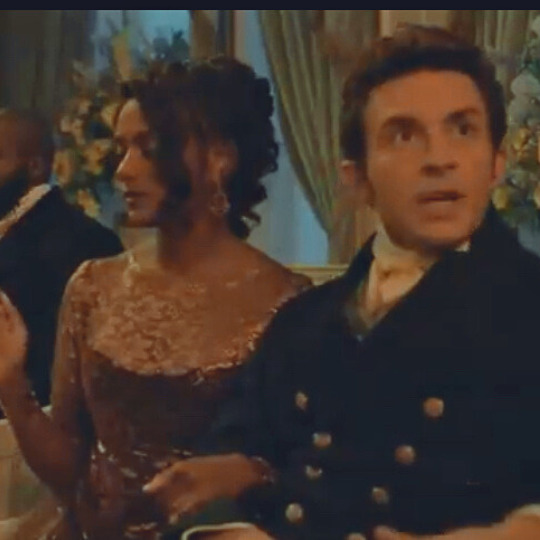
I’m obsessed with Kate and Anthony just having their arms interlinked while playing charades
Because there is literally no need for it, they’re already sitting right beside each other, shoulder to shoulder, and they’re playing charades, which is not something that requires them to move in coordination??? And, you can see the empty space on the couch beside Kate, so there’s plenty of space
But does any of that really matter to Viscount and Viscountess Velcro? Not even a little bit!
They will be interlinking their arms through a game of charades, because simply sitting next to each other is not enough, they must have, at least, four points of contact between themselves at all times
#bridgerton season 3#anthony bridgerton#kate sharma#kate sharma x anthony bridgerton#kanthony#bridgerton#bridgerton analysis#no wonder the ton was like oh these dumbasses are BESOTTED#because there’s literally no other words to describe this level of stuck togetherness#they’re never again going to be more than 3 ft apart#they got married and somehow became MORE sickening#and this is Mr love has no place in my marriage#sir all your marriage has no place for is actually personal space#lord clingerton 🙂↕️
1K notes
·
View notes
Text
It just occurred to me that, in every timeline, Madoka always believes Homura. Even when no one else does, even when what Homura is saying doesn't seem to make sense.
The two biggest examples I can think of happen in the main series. In one of the timelines in episode 10, we see Sayaka brushing off Homura's warnings about Kyubey and the true nature of Witches. She even accuses Homura of trying to sow discord in the group because she's in cahoots with Kyoko.
But later on in that same timeline, Madoka uses her last remaining Grief Seed on Homura because she is aware that Homura is a time traveler. We don't know when that happened because it's not shown, but it's very possible she learned Homura's backstory in that same conversation with Sayaka. And unlike Sayaka, she wholeheartedly believes Homura's story, to the point of using her one and only lifeline on Homura and explicitly asking her to prevent this tragedy from happening.
Also, in the main series timeline, Homura tearfully reveals her past to Madoka in episode 11. She offers no concrete proof and acknowledges that what she's saying is crazy, but all she asks is that Madoka allow Homura to protect her. In the next episode, before finally making her wish, Madoka acknowledges that Homura has always been watching over and protecting her. Madoka sincerely thanks Homura, promising that she won't allow Homura's hard work to go to waste. And again, this is before she becomes a goddess and remembers all the other timelines. All she has is Homura's word, and she believes it.
Multiple times throughout the series, Homura expresses her frustration and despondence over the fact that nobody believes her or heeds her warnings. But someone does. It's just that that "someone" happens to be the person she's trying to keep away from everything.
#I was literally falling asleep when this post idea came into my head#the way I IMMEDIATELY sat up and grabbed my laptop lmao#who cares about being sleep deprived tomorrow <3#pmmm#my analysis#analysis#madoka kaname#homura akemi#puella magi madoka magica#madoka magica
638 notes
·
View notes
Text
Kabru, impossible mutual understanding & unknowable objects
Despite his concerted and constant efforts to understand other people, it’s established in a few extras that Kabru believes that true mutual understanding between certain different races is impossible. Specifically, between long-lived and short-lived races, and between humans and demi-humans. Partially, we can trace this conviction back to specific hang-ups caused by his life; the trauma of the Utaya disaster, prejudices he carries from his childhood, and his experience of racism among the elves. In this “little” essay, I’m gonna discuss how I think those experiences formed this belief, how it comes out in his actions, and how some of his actions seem to contradict it. The question of whether it’s possible to reach mutual understanding with other living beings despite our differences is one of the core themes of the manga, and I’ll also touch on how this aspect of Kabru’s character links to that.
Seeking understanding
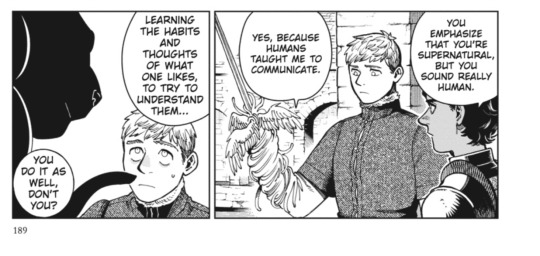
Kabru is a character who devotes a huge amount of time and effort to understanding people, and he is very good at it. In his internal monologue, we can tell how advanced and complex his skills of analysis are. He is able to read a huge amount of information just from looking at people's faces and body language.


People are, to him, what monsters are to Laios. This is something that's been expanded on at length in other, excellent meta. It's the fact that they're foils; it's the fact that Kabru is also very easy to read as autistic, with a special interest which is the opposite and parallel of Laios'. It's something that came out of trauma and alienation, as Laios' special interest in monsters also began as a coping mechanism.
The complicated origin of this "love" for monsters and for people comes through, I think, in the fact that one of the places we see both characters use their fixation is in being very, very good at killing the thing that they love. This also ties into the idea that loving something isn't even remotely mutually exclusive with using it to sustain your own survival; using it for your own purposes; hurting it or killing it. Love can be, and often is, violent, possessive and consumptive. This understanding is part of what makes Kui's depiction of interpersonal relationships so compelling to me.
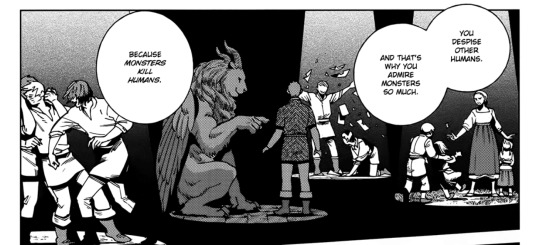
While Laios fixated on monsters and animals to seek a place of escape, in both his imagination and his self-image, from the humans who he couldn't understand and who couldn't understand him, Kabru seems to have fixated on understanding people in order to navigate the complex, socially marginal places that he has been forced into throughout his life. As an illegitimate child raised by a single mother with an appearance that marked him out as different to the point his father's family wanted to kill him, and a tallman child raised among elves who didn't treat him as fully human and wanted him to perform gratefulness for that treatment – treatment that, after he met Rin at age 9, he certainly always understood could be a lot worse – his ability to work out what people wanted from him, whether they were friendly or hostile or had ulterior motives, wasn’t just an interest. It will have been an essential skill.
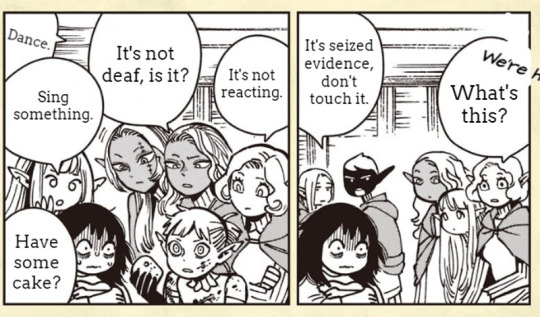
Milsiril, I think, was a flawed parent who tried to do her best by Kabru and did a lot of harm to him despite her best intentions. She may have treated him much better than an average elf would have, but like Otta and Marcille's mother, there are other elves with different outlooks on short-lived races. How would they judge her treatment of him? We don’t have any insight on what it could be, but to be honest, the person’s whose opinion of her I’d be most interested in knowing is Rin’s.
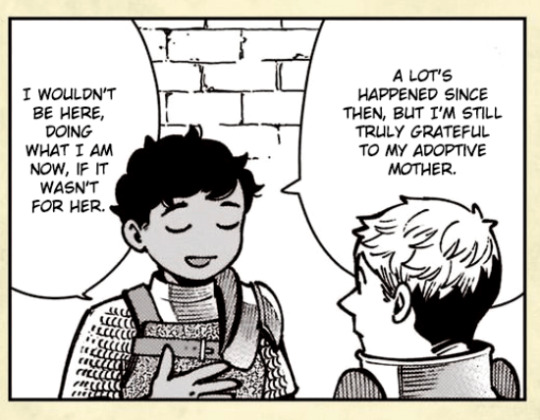
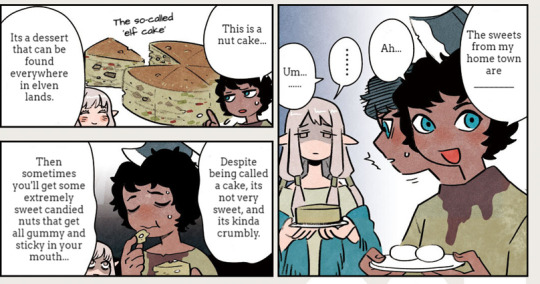
But even if she'd been perfect, living as an trans-racial adoptee in a deeply hierarchical nation with a queen who is a 'staunch traditionalist' who wouldn't even acknowledge the existence of a half-elf like Marcille (according to Cithis) is an experience that would deeply impact anyone.
Elves & Impossible mutual understanding
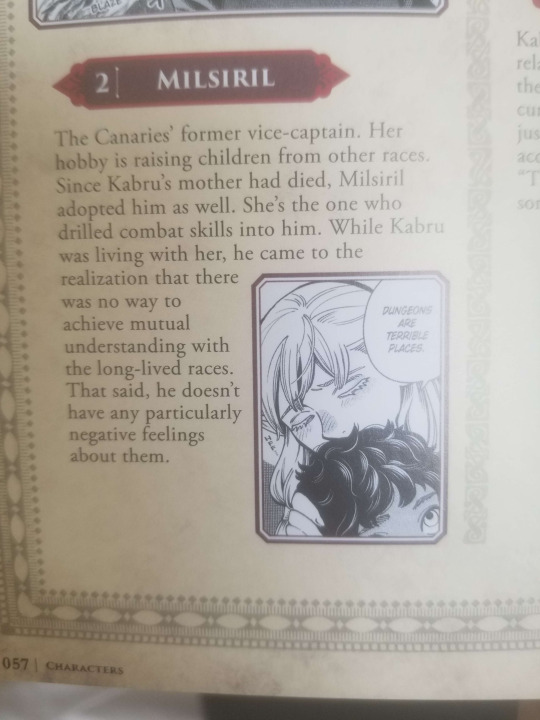
While Kabru was living with Milsiril - in other words, while living in the Northern Central Continent - he came to believe that "there was no way to achieve mutual understanding with the long-lived races."
This is evident in his political project: he wants short-lived races to have ownership over the dungeon's secrets. Despite his dislike of the Lord of the Island, he's a useful bulwark to stop the elves taking over. Despite his doubts about Laios, Laios needs to be the one to defeat the dungeon, because if he doesn't the elves will take over.
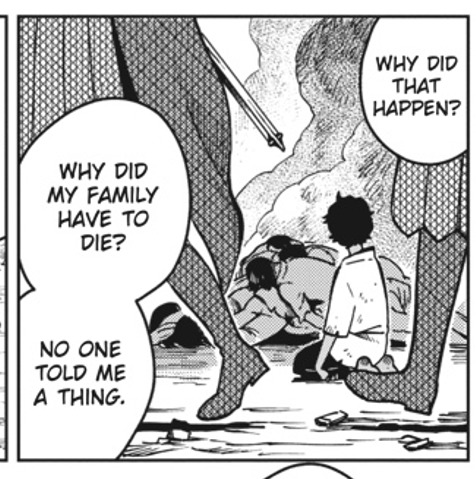
Kabru still carries a deep scar from Utaya, one that was exacerbated by the fact that he never got an answer to any of his questions about what happened or why. This, despite the fact that Milsiril knows about the demon and how it works. Do you think Kabru, with his social perceptiveness that borders on the superhuman, wasn't aware that she knew more than she would tell him?
Given that, the fact that he gets to a place where he "doesn't have any particularly negative feelings about [elves/long-lived species]" .... well, to put it bluntly, I believe that he thinks that's the case, but I kind of doubt it. After all, if he did have resentment, of Milsiril (someone who was his primary provider and caretaker since age six, and who despite her flaws, loves him and who I do think he loves) or of elves (who he has had to play nice with for most of his life, in order to survive, and will still have to play nice with in order to achieve his goals, since they hold all the power) what would that do except hurt him and make his life harder? Kabru is Mr. Pragmatic, so I don't think he'd let himself acknowledge any such feelings he did have. Exactly because he can't acknowledge them, they're well placed to get internalised as beliefs about the Fundamental Unchangeable Nature of the World.
However, these stated beliefs seem to contradict his actions. Despite his belief in the impossibility of forming a mutual understanding, he certainly seems to try to understand long-lived people, just as much as he does short-lived people. There's no noticeable difference between his treatment of Daya & Holm versus Mickbell & Rin that isn't clearly down to their relationship with him. His skills of human analysis were honed and developed while living amongst elves, and as soon as he's alone with Mithrun he immediately sets to understanding him - his interests, his motivations, his needs, and his past.
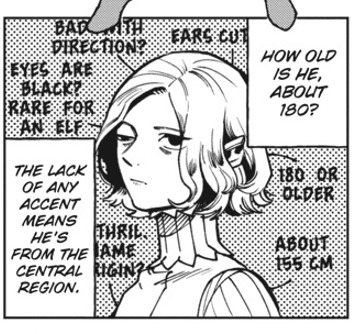
He treats him considerately and without bias, and despite the fact that Mithrun conquering the dungeon for the elves is both a reenactment of a core part of his childhood trauma and a political disaster for his aims, that doesn't seem to colour his perspective on Mithrun negatively at all.
This is something I find extremely laudable about Kabru, and it's another way he parallels Laios. He seems to understand that people, as a rule, (in Laios' case, he understands this about monsters - and eventually, all living beings) will act in their own interests, and if those interests conflict with yours, might harm you. But that's just their nature, and it's not something that should be held against them; you're also doing the same thing, after all. The crux of Laios' arc is precisely that he has to accept the responsibility of hurting someone else in order to achieve what he wants.
Kabru is deeply concerned with his own morals, what he should and shouldn't do, but mostly in the context of responsibility for the consequences - a responsibility he takes onto himself. He isn't scrupulous about what he needs to do in order to create the outcome he wants, but if he fails to create that outcome, then....
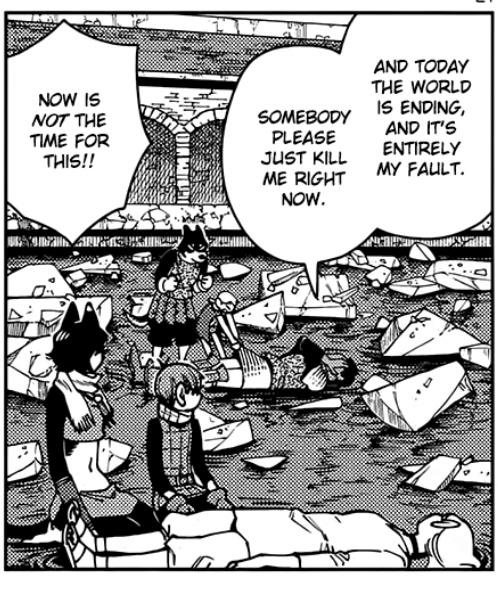
He blames himself to the point of thinking he should die. He doesn't blame Laios, or seem at all angry with him, despite concluding he should have killed him to prevent this outcome. That's because in his eyes, ultimately Laios was going to act according to his own nature, and it's Kabru's fault for not understanding that nature well enough. He's extremely confident in his ability to understand and predict others, (including elves and other long-lived people). Then, where does his conviction that mutual understanding is impossible come from?
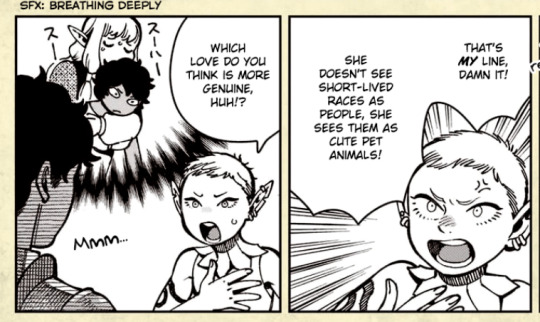
Partially, it's the "mutual" part. I'm sure Kabru, who isn't able or willing to deny Otta's insinuation that Milsiril saw him more like a pet than a son, has felt that his full interiority, the depth of his feelings and his ability to grow, act, and think as a fully equal being, was something that the elves around him just couldn't grasp. Because that was their excuse for it, he came to understand this as a gulf between short-lived and long-lived beings, an inevitable difference in outlook caused by their different lifespans.
This experience might be part of what leads to his iconic “fake” behaviour. He trusts his ability to understand others, but if they aren’t able to understand him, then there isn’t any benefit to being honest about his feelings and thoughts. If his attempts to reach mutual understanding with his caretakers were never able to be fulfilled, then it isn’t any wonder that he reacts with such surprise and horror at blurting out his desire to be Laios’ friend.
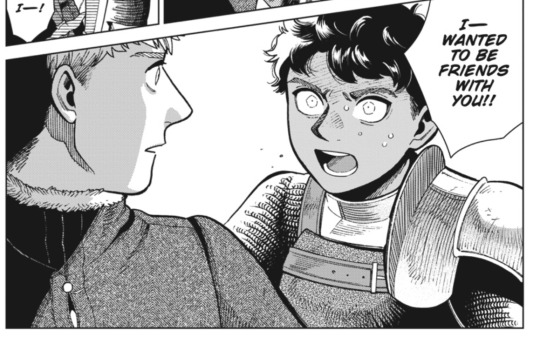
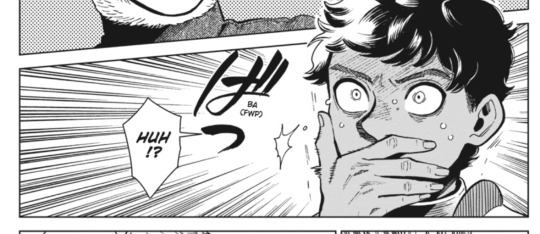
In his experience, making yourself vulnerable in that way only leads to being hurt. Soothing him, hushing him, lying to him, talking to him like a child that isn’t able to use proper judgement – that’s an inadequate and deeply hurtful way to respond to genuine distress, the desire for autonomy, or disagreement. Ultimately, I think that’s why he comes out on the side of being grateful to Milsiril; because she did equip him with the skills and knowledge he’d need to reach his goal, and let him go.
Though he could understand them, they couldn't understand him. To the extent that was true - which I'm sure it was - it wasn't due to anything about lifespan. It was due to the elves’ racism, and the solipsitic mindset & prejudiced attitude that it caused them to approach him with.
Because, if it needs to be said, the idea that there is an unbreachable gap in understanding between the long-lived and short-lived species is not true. Marcille and Laios have a much greater difference in lifespan than any full elf from any short-lived person, and they’re able to understand each other – maybe not perfectly, but better than many other people who are closer in life-span to them.
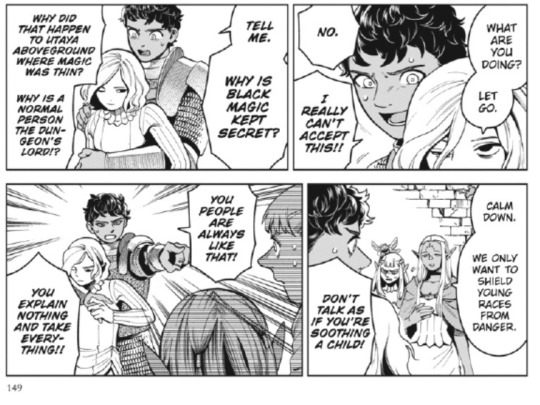
That doesn’t mean that I think Kabru is wrong about this, however. Because there’s an interpretation of his statement that is reflected in his actions and is true. When he talks about his problem with elves, it’s not just their attitudes: it’s their power, and what they use it to do. They “explain nothing and take everything”. Though it’s presented in the guise of ‘guiding and protecting’, in fact it’s a simple case of a powerful nation using their military power, wealth, access to resources, and historically stolen land – including the island itself – to protect their own interests and advance their own agenda. That’s why they’d be able to show up, seize the dungeon, and forcibly take Kabru’s party and Laios’ party to the West. If Kabru wants to stop that from happening, or change that status quo, persuasion or a bid to be understood would be completely pointless. Between the political blocs formed by long-lived species and the interests of short-lived species, “mutual understanding”, given their current, unequal terms, would be impossible. This is something that we see reflected in Kabru’s actions; before he asks his questions about the dungeon, he grabs Mithrun as leverage. He never really attempts to persuade the canaries to see his point of view, because that would be pointless: they’re agents of the Northern Central Continent’s monarchy, and will act in its interests regardless of any individual relationship with him.
I don’t think Kabru sees the different dimensions of this belief of his in quite such clear terms, however, as is evidenced by the other group who he thinks it’s impossible to communicate with.
Demi-Humans & Unknowable Objects
The other place that we see his conviction about the impossibility of mutual understanding is in the kobold extra.
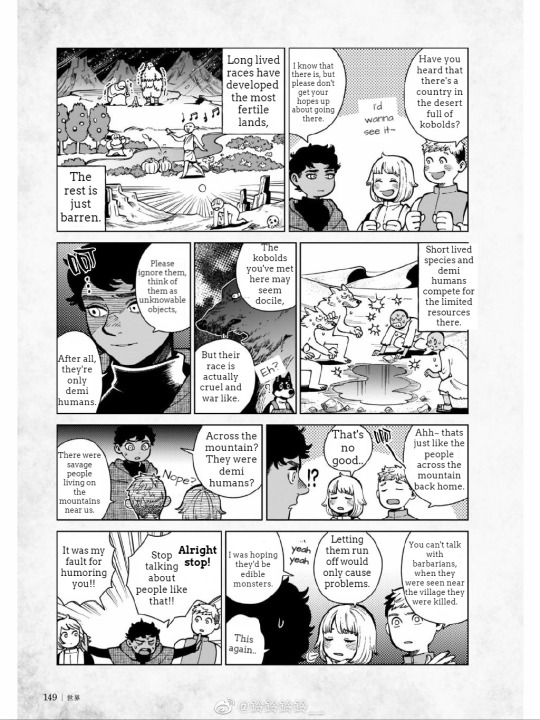
I'm including the whole thing, because I think it's an excellent and clever piece of world-building. Aside from what it says about Kabru, which I'll expand on shortly, what this extra does is deconstruct and call into question the usual "fantasy ontological biology" present in these sort of DnD-like settings. Essentially, the kind of worldbuilding where a race (such as kobolds) can be described as war-like, and that's establishing something essential about their biological nature. That's common to the point that if Kui didn't include this, some people would probably come away thinking that's the case about, e.g., the orcs.
But here, despite what Kabru is saying, the information the reader actually gets is:
the conflict between short-lived humans and demi-humans such as kobolds is mostly over access to material resources that they need to survive.
These resources are scarce because powerful nations, such as the elves, have monopolised them.
Kabru, who has grown up in a place at the centre of these conflicts, ascribes essential, negative traits to a cultural group which was in direct conflict with his own. Communication with this other group is impossible; they aren't people, they're more like objects.
oh yes! just like this conflict between groups of tall-men, a conflict which the reader will immediately interpret as more clearly analogous to real-life racism. Our other protagonists also carry prejudices from growing up in a place where a marginalised group was in conflict with the dominant group over scarce resources. It's definitely impossible to communicate with these people, and you can only kill them.
Woah, when you say it like that, it sounds pretty bad!
But also, nobody walks away having had a realisation or unlearned their prejudices - because they don't have the tools they need to do that work. Yet. I do think, to an extent, it could happen - especially with Kabru, since it's suggested in the epilogue that Melini might become a safe-haven for demi-humans.

To focus in on Kabru, the key here is his statement that you should think of demi-humans as "unknowable objects". Even his extraordinary powers of understanding have seemingly hit a limit. Part of this is just inherited prejudice, and doesn't need to have a complicated psychological explanation, any more than the elves who were prejudiced against him need one.
But also... this is probably somewhat linked to the way demi-humans seem to be considered "pseudo-monsters". They're the place that the strict delineation between the human and the monstrous is permeated. Laios, who is not interested in humans, remembers and is excited by Kuro. Chilchuck and Laios argue over whether it's OK to eat a mermaid. Kabru's prepared to (pretend to) roll with the idea that Laios ate the orcs.
But these are people, aren't they? Of course, this is a social construction, as we see from the fact that in the Eastern Archipelago, the label of "human" is reserved for tallmen, but in most of the rest of the world it depends on some obviously arbirary classification based on number of bones; "demi-humans" aren't in any essential way monstrous, except to an extent in their appearance, and physical location - due to their marginal social status, they're pushed out to live in unsafe places such as dungeons.
Therefore, Kabru's view of demi-humans as fundamentally "other", unable to be understood - monstrous - could be read as akin to abjection, the psychoanalytical concept described by Julia Kristeva. In order to create a bounded, secure superego, that thing which permeates and calls into question the border between self and other, human and animal, life and death, is rejected and pushed to the margin.
“Not me. Not that. But not nothing, either. A "something" that I do not recognize as a thing.[...] On the edge of nonexistence and hallucination, of a reality that, if I acknowledge it, annihilates me. There, abject and abjection are my safeguards. The primers of my culture.” (Kristeva et al., 1984, p. 11) “It is thus not lack of cleanliness or health that causes abjection but what disturbs identity, system, order. ” (Kristeva et al., 1984, p. 13) “The pure will be that which conforms to an established taxonomy; the impure, that which unsettles it, establishes intermixture and disorder. [...] the impure will be those that do not confine themselves to one element but point to admixture and confusion.” (Kristeva et al., 1984, p. 107) (discussing food prohibitions in Leviticus)
This is both (due to its affinity with food-loathing and disgust) a very fruitful concept to apply to dunmeshi, and a psychoanalytical theory which I wouldn't exactly cosign as True Facts About Human Psychological Development. You may also know the abject from its utilisation in the classic essay "Horror and the Monstrous-Feminine" by Barbara Creed - that's a lot more approachable than Kristeva if anyone's interested.
Key here, though, is that through the symbol of the "demi-human" is embodied a step between "human" and "monster" - and that's a prospect that puts at risk the whole notion of an absolute separation between those two categories in the first place. To Laios, that's something wonderful, and to Kabru, it's terrifying. We can see this principle further embodied in the relationship both characters have with the notion of becoming monstrous.
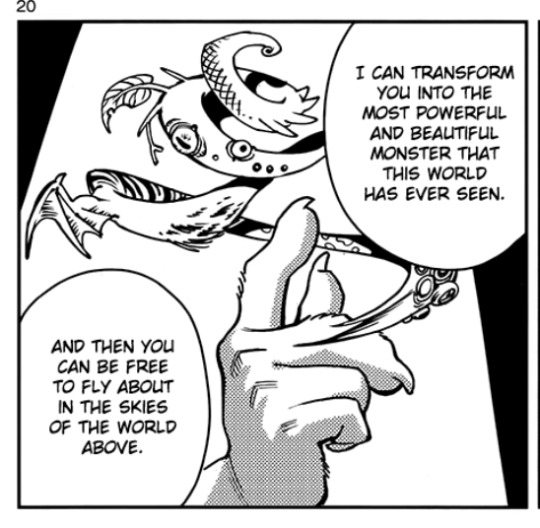
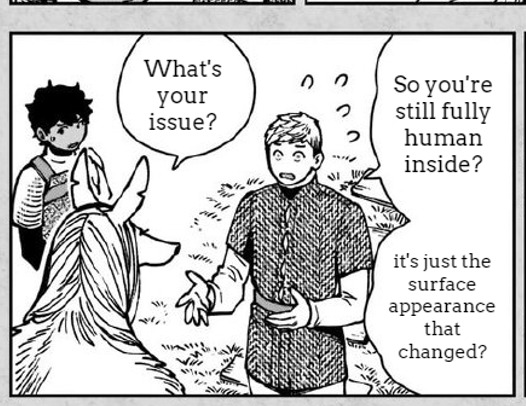
To Laios, this is transcendent, and represents a renunciation of everything human - in fact, if it didn't, it wouldn't "count".
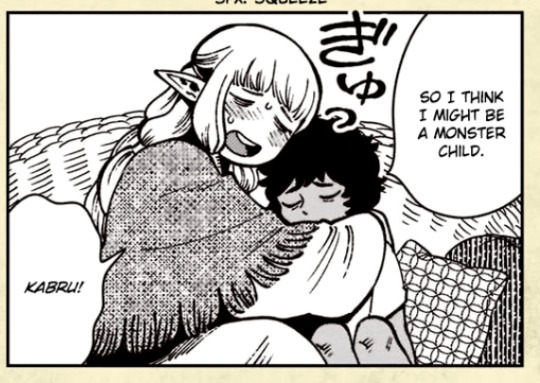
To Kabru, it's a deeply-held fear, established by his childhood alienation (due to his illegitimacy, his eyes, and perhaps also his neurodivergency), deepened by monster-related trauma and the sense of responsibility and survivors guilt he feels for what happened at Utaya. His identity as a human who is not monstrous is key to his sense of stability and safety; he doesn't want to touch monsters, he doesn't even want to see them.
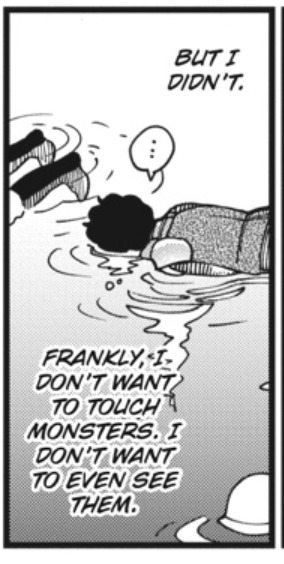
To acknowledge a kinship, a possibility of similarity between the things he loves (humans) and the things he hates (monsters) would be more than touching them - it would be putting them inside him. We know, quite explicitly, that this notion is triggering to Kabru. He literally has what seems to be a flashback when he's about to eat the harpy omelette.
So he abjects it, classifying the demi-human as fundamentally unlike him - an unknowable object, or an object that he refuses to know. Because in understanding it, he would interject the things he hates and fears into his self, which is already, always under threat by that hated and feared object.
Of course, again, Kabru isn't very good at enacting this refusal in practice. For one, when he chooses between his desires and ingesting the feared object, eating monsters... he eats monsters. Part of this is treating himself badly, the "ends justify the means" mentality. His goal is to destroy all monsters, so if he needs to become monster-like to do that, he will. But part of it is also the other motivation that he didn't even seem to know about until he said it: he wants to become Laios' friend, and to learn from him how a person can like monsters. He wants, at least in some part of him, to reconcile the feared and hated object into something he can understand.
For another:
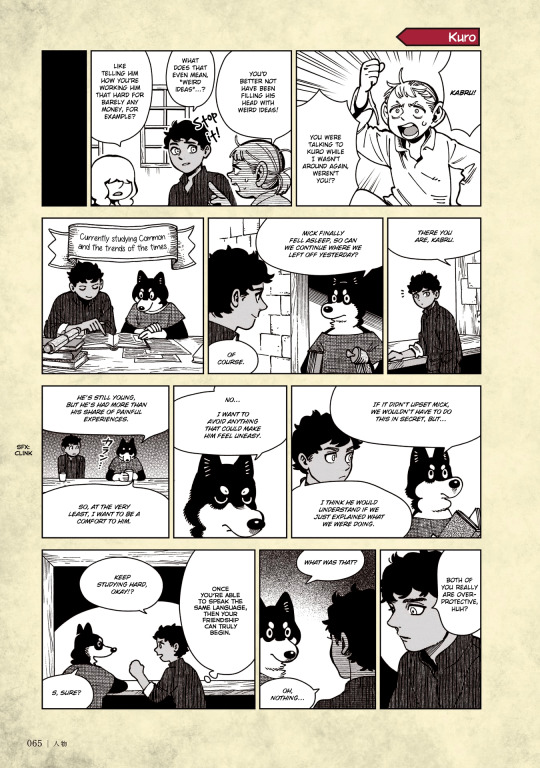
Kabru can speak the kobold language. In the first place, while this may have been common in Utaya, it also could have been something he chose to learn, an early expression of his interest in understanding and talking to all sorts of people. It isn't the kind of thing you learn if you believe that communication between yourself and the group that speak it is impossible, is it?
It's possible to harbour prejudices against a group while being kind to an individual, and given Kabru has those prejudices regardless of his reasons, that is what he is doing. But also, his treatment of Kuro doesn't reflect a sincerely held belief that he's an "unknowable object" at all. His approach is exactly the same as it is to any other person: an analysis of goal and motive, and an attempt to help if he's sympathetic and their goals align - going out of his way to give language and local knowledge lessons in secret. His conviction that Mickbell and Kuro will truly become friends when they can properly communicate is completely contradictory to any sense of demi-humans as fundamentally different, or impossible to reach mutual understanding with. To me, it seems like this self-protective shield against the corruptive force demi-humans as an idea present to his identity, this abjection, when Kabru is face-to-face with one, just simply can't hold up against his finely honed skill of intellectual empathy. Perhaps because he's autistic, it seems his "empathy" is less an emotional mirror response, and more a set of cognitive skills for analysis of others. That instinctual, emotional empathy might not trigger when presented with a member of an out-group, but if it’s possible for Kabru to turn his cognitive empathy off, we don’t see him do it.
This isn't to say that this prejudice doesn't affect his behaviour. For one, it could negatively impact his judgement of politics and policy, where individual people don't enter into it. For another, I'm not convinced he'd be willing to overlook Mickbell's exploitative relationship with Kuro if Kuro wasn't a kobold. As it is, since both of them are satisfied, he doesn't feel like he needs to intervene, regardless of the fact Mickbell isn't paying Kuro. But if Daya and Holm were in a relationship, and Holm took both Daya's and his own share from their ventures, but only compensated her in living expenses and kept the rest, do you think he'd tolerate it, for example? Even if she said it was OK?
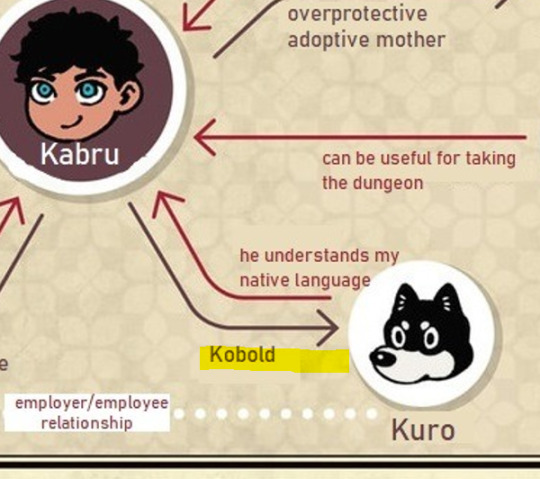
Conclusion

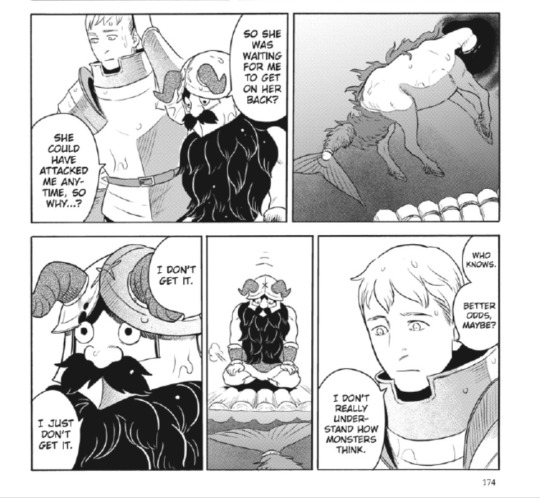
The kelpie chapter establishes that "people can never know what monsters are really thinking." That isn't just true of monsters, though.
True mutual understanding is impossible - between anyone. We can never truly understand another person's heart. This is touched on in, for example, the existence of shapeshifters and dopplegangers. Even a monster that seemed like a perfect copy of a person wouldn’t be that person, and wouldn’t be a satisfactory replacement.
We’re intended, I think, to understand the winged lion's repeated suggestions to just replace people who have been lost with copies as something uncanny, which demonstrates the way that the winged lion never manages to attain a complete understanding of humans. A version of a person who was created to fulfil your memories of them, to be the person who you wanted them to be, would be a terrible, miserable thing.
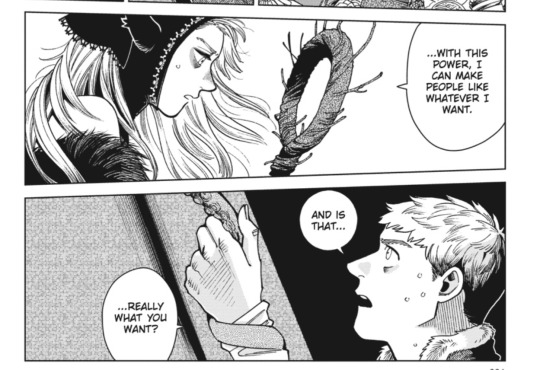
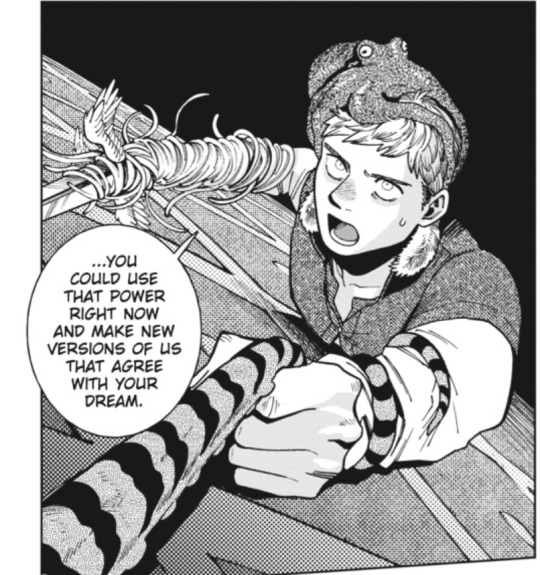

Disagreeing, coming into conflict, and misunderstanding each other, are essential parts of what it means to be living beings, as fundamental as the need to eat.
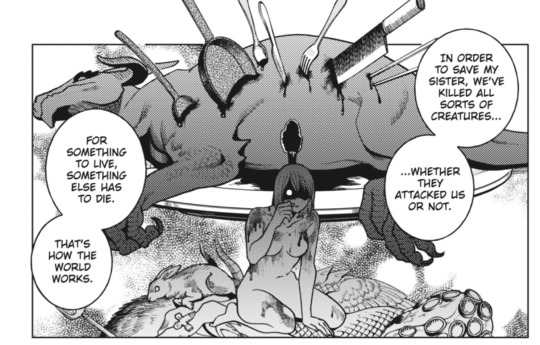
The only thing to do is not to take more than you need to eat to survive, and not impose your own desires onto others. To do your best to sincerely communicate your desires, even if they're embarrassing or vulnerable or strange, like Kabru eventually does with Laios; like Laios does, bit by bit, with the people around him; like Marcille does, Chilchuck does, Senshi does... to hope they will accept you, and do your best to understand them in return.
We can re-examine, in that context, Kabru's line about the elves' tendency to "explain nothing and take everything".
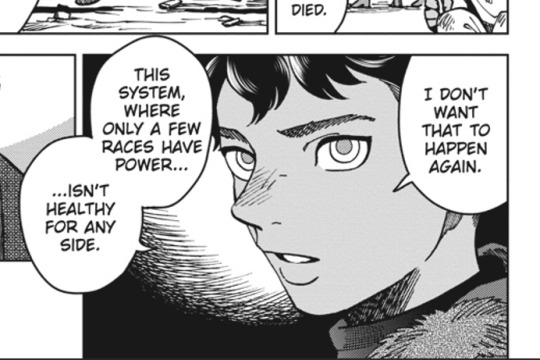
They have the power to impose their preferred "menu" onto less powerful groups. And in that context, mutual understanding being impossible just means that they won't give up their power because they're asked nicely. Kabru's goal is to seize the truth that they won't give to him, and to create a situation where they can't take everything. Because he's accurately surmised that nothing about the treatment of short-lived races will change so long as the power imbalance remains. Despite the way he mistakenly ascribes part of that to "long-lived vs short-lived" or "human vs demi-human", the actual gulfs in understanding he identifies are structural, are about power and about access to material resources and safety.
I think he could come to recognise this. Yaad is teaching him political science after all, and while a prince's lessons on political science won't exactly get at much that's radical or invested in the interests and perspectives of the marginalised (Capital is a critique of for a reason after all...) I believe in Kabru's ability to learn critically and get more from a lesson than it was intended to teach.
#og post#kabru of utaya#kabru dungeon meshi#laios touden#dungeon meshi meta#dungeon meshi#dunmeshi#dungeon meshi manga spoilers#dungeon meshi analysis#kuro dungeon meshi#the canaries#milsiril#continuing to develop my kabru theses.#literally sitting and thinking about kabru all day. rotating him.#he's in the microwave. to me.
2K notes
·
View notes
Note
Ok, but why do I imagine Eight being the unofficial child of Pearl x Marina?
Because I imagine Eight was minding their business and all of a sudden, Pearl would slam the paper down and said “You’re adopted now”
Basically OTH at the start of their world tour haha, I love that they took Eight with them.
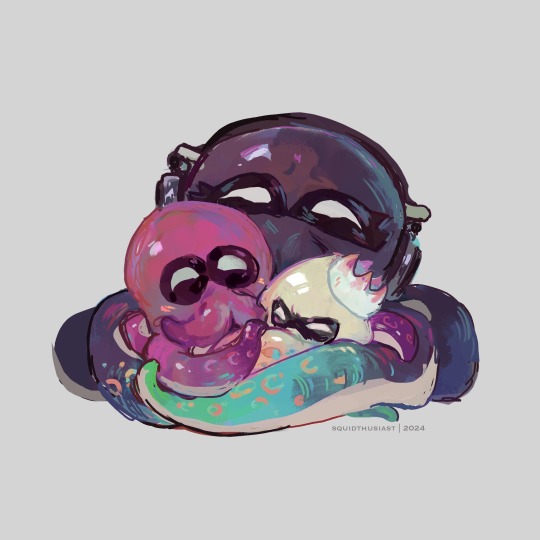
I have more detailed thoughts under the cut for those interested in my ramblings, analysis and interpretations of the characters.
Disclaimer: This is my own take on it, don’t let it ruin your fun!
I personally don’t really subscribe to the fandom’s ‘pearlina moms’ headcanon.
On the one hand, I am an absolute sucker for the ‘found family’ trope, and I definitely think Agent 8 and OTH fit in it!
On the other hand, I think people immediately put Pearl and Marina into the ‘parenthood’ box, a little too eagerly. Not saying this specific ask is that, btw, it just reminded me of some instances i’ve seen.
I personally think that the relationship between OTH and Agent 8 is a little more nuanced & sibling-esque, for the following reasons:
1. Within canon, we often see 8 being referred to as a friend by both Pearl and Marina.
Pearl does it more explicitly (see that one interview at her house), whereas with Marina it’s more insinuated (ex. In the Side Order dev diaries, she starts calling Agent 8 as ‘Eight’, which is stated to be a name used by their friends).
Pearl seems to be an accidental-duck-parent of sorts who haphazardly collects octoling teenagers & young musical talent. It goes in line with her whole mentor-esque leader personality, and i’m sure these disoriented teens find relief in an idol who seemingly knows what she’s doing (she really doesn’t).
However she doesn’t act in a parental manner. More-so like your estranged gay cousin who hit it big in another country and is down to show your queer little butt the ropes.
Marina on the other hand seems to have a more empathetic approach with Agent 8 (opposite to Pearl’s brashness). Marina clearly connects with Agent 8 through their shared experience as defected octoling soldiers, and probably sees her younger self in them. She’s already caring as it is, but this is accentuated during octo expansion given the circumstances.
I feel however that, unlike Pearl, Marina has a bit of a harder time actually forming a bond with Eight at the beginning. Their similarities (seemingly) end at their shared experience, and probably leaves Marina awkwardly wondering how to approach them further. What we can assume though is that they become closer friends during OTH’s world tour, given the events described in the Memverse Dev Diaries.
Meeting Eight during difficult circumstances (OE) and helping them get out creates a sense of camaraderie between them, which probably devolves into genuine care, established friendship and a strong bond amongst the three overtime.
2. Pearl and Marina are very career-centric both in Splat 2 and 3.
It is reasonable that the two young idols, who see their fame and musical recognition rise spectacularly & fast, are not particularly interested in settling down at this point in their lives.
Now entering her late 20s, Pearl is most definitely still interested in keeping the ball rolling with Off the Hook’s international success. Her character often points towards restlessness, freedom and discovery. There has definitely been character development in regards to her maturity in Splatoon 3, but these aforementioned traits are still ever present in her demeanour & decision-making.
Marina on the other hand can be seen slowly blossoming from a supporting character to being her own person. She definitely develops more self-confidence by Splatoon 3, but is still naturally bashful. It’s clear that she is allowing herself to explore & open up to new things for her own sake. She remains a caring and somewhat nurturing individual, but she is at a stage where she’s learning to live for herself and not for others.
Parenthood (and all the responsibilities and sacrifices it entails) at this moment of their lives would probably freak Pearl out, and stunt Marina’s personal growth.
3. The age gaps between OTH and Agent 8 are too close for it to create a parent/kid bond.
This makes their relationship a little hazy in regards to roles; 8 is still young enough that they may seek out rolemodels and mentors (still relatively influenceable), but they’re also nearing their 20s. By this point they are fairly self sufficient, have a sense of their personal values & identity, and they are relatively responsible & mature.
Pearl and Marina are 8’s seniors by approximately 4-6 years. However, in Splatoon 2 they’re entering their early 20s and their career has just begun to take off.
They are both still relatively youngsters, albeit older & more mature(? glancing at Pearl) youngsters than 8. This places them in a position where they can guide 8 and offer certain support and resources, but lack the maturity and experience of a full-fledged adult. This would approximate their relationship closer to that of siblings in a family setting.
Pearl & Marina are also less likely to feel a duty towards Eight as an adult would with a child. Instead, the latter’s circumstances are more likely to incite feelings of rapport and compassion as a fellow young inkfish.
Now, with all of this said, I will acknowledge that friendship/found family is MUCH more nuanced than a strict binary.
From personal experience in my last years of college, I did find myself caring for my fellow freshmen as though they were my kids, in certain ways. Hell, I called them my kids.
I acted as a proud parent whenever some of them achieved something, attempted to pass down my knowledge to them, and was protective of them to a certain extent.
They also annoyed me sometimes, like younger people do haha. And i’m sure I annoyed them too!
So I wouldn’t put it past OTH to call Eight their kid and have this mentor/parent-esque rapport with them in certain circumstances.
This is all based both on canon & my own interpretations of it, but still closely aligned to what has been shown in-game.
So if you have a different interpretation of Agent 8 and OTH, that’s great! I love to see people’s personal headcanons. Ultimately, Agent 8 is meant to be somewhat of a blank slate for the players to mold, with some hinted-at personality traits of their own.
As long as you have fun with these characters, that’s all that matters. This is just my personal opinion on their relationship in-game.
If you read all of this, you deserve the biggest golden star for listening to my incessant yapping 🤲⭐️
Feel free to bother me about this or other opinions you may have in my inbox, just be kind please!
#squid asks#off the hook#marina ida#pearl houzuki#Agent 8#splatoon 2#splatoon 3#side order#character analysis#headcanons#splatoon headcanon#splatoon fanart#long ramble#I hope this person doesn’t regret this ask *crying*#sometimes I take things too literally#splatoon#my art
1K notes
·
View notes
Text
Okay, so we know that Charles' polo goes red>burgundy>black and back by the end of the season.
Because there's so much going on, I always missed the exact transitions. This time I specifically tracked them down. (Apologies if this has already been done.)
Charles shirt is bright red through the majority of the Devlin House, even in Hope's Diary scene, when he opens up to Crystal.
Even when he first swings at Mr. Devlin and gets knocked back, his shirt is red.

The very subtle shift to burgundy is after he disappears and first reappears in the loop.

It remains burgundy throughout the entire lighthouse leapers episode and beginning of the two dead dragons.
I finally realized the very last moment we see of Charles in the burgundy is with Crystal. She tells him after the confusing makeout night, "But I think we should be friends," and kind-hearted Charles, of course, respects that and puts on a friendly smile.

It's difficult to see in the next scene with him because of his jacket, the angle he sits at on the ladder, and the lighting, but it's immediately after that when we first see him in the black polo.

My brother in death, you are NOT doing well.
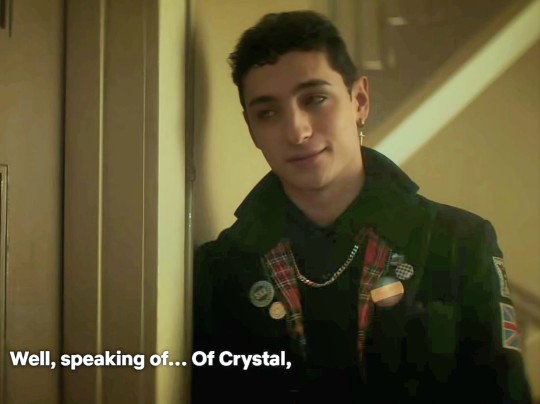
here's another song from Jayden Revri's official Charles playlist, that I think is about this conflict with Crystal:
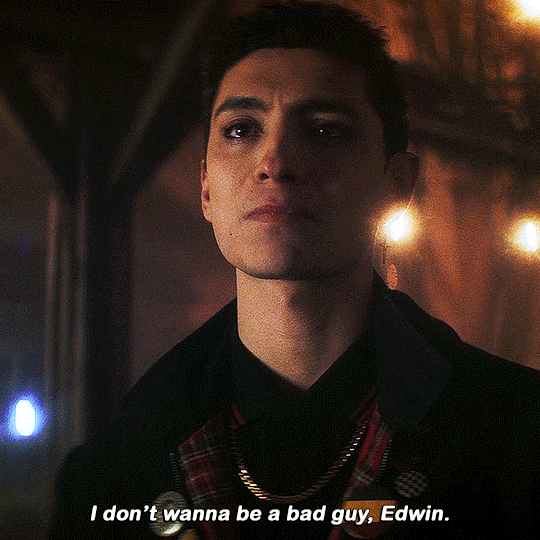
His shirt is still black during the "I don't wanna be a bad guy" scene.
After Edwin's affirmation of Charles' inherent goodness, it is directly after this scene that the shirt goes back to burgundy!!!

He's still wearing the burgundy during the confession:

BUT IT GOES BACK TO BRIGHT RED LITERALLY RIGHT AFTER EDWIN'S CONFESSION AND THEY ESCAPE HELL TOGETHER!
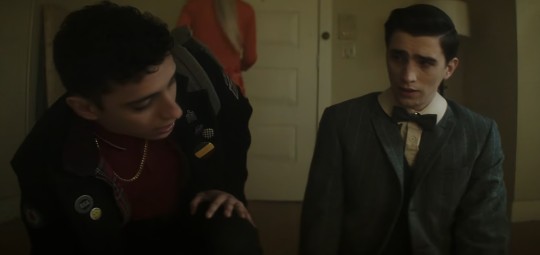

Yo I equally love Cryland and Payneland but the show canonly said "Crystal hit him in the loneliness and Edwin hit him in the loved"
#Spotify#text post#charles rowland#crystal palace#cryland#love cryland but i do accept the misunderstanding conflict angst#costume design#dead boy detectives#dbda#dead boy detective agency#makeout scene#but i think we should be friends for now#the case of the devlin house#the case of the lighthouse leapers#the case of the two dead dragons#scene analysis#reference#if this has already been pointed out sorry but these are for my own notes at least#the case of the creeping forest#the case of the very long stairway#dude i've never been this emotional about a fucking shirt before#this fandom is literally unravelling my sanity#the case of crystal and charles#fandom resource#research
1K notes
·
View notes